Entrepreneur Stories

The Great Donut Revolution – Duck Donuts
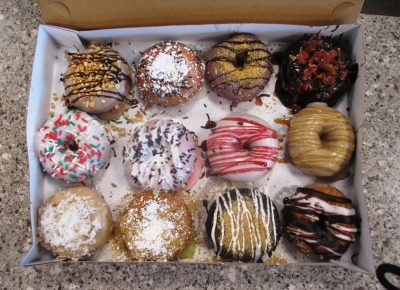
My article about the amazing Duck Donuts and their history was published in the Summer 2018 issue of JerseyMan Magazine. Click here to see the article on their website, or click here to see the PDF magazine version. Thanks for reading.
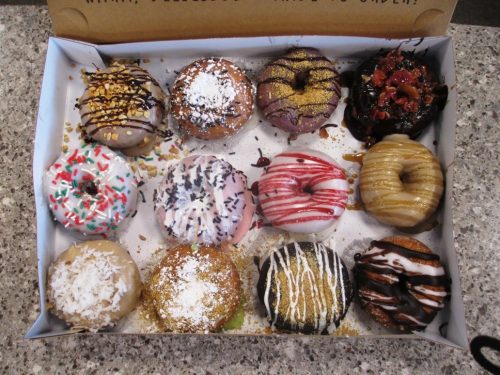
A “duckzillion” combinations of donuts.
Duck Donuts began franchising just five years ago. Today they have sold more than 200 stores, including new openings in Marlton and Avalon. The donut-buying public is ecstatic.
We should all love our jobs as much as Ted Gill does.
It’s refreshing to hear a business professional, with franchise ownership aspirations, unashamedly spout three “really”s describing his product.
“People really, really, really love the idea of fresh, made-to-order donuts,” he says, when asked how business has been since the opening. “Business has been great.”
There’s no measured, calculated tone with Gill. His enthusiasm leads to unabashed exaggeration. “There is a little bit of a wait, but it’s definitely worth it. You get a warm donut, and it’s a million times different than if you got one just sitting around the shelf somewhere.”
Ted Gill is the general manager at one of the newest Duck Donuts locations. He runs the show in the recently opened Marlton store in the Marlton Crossing strip mall, as the rapidly expanding chain of made to order donut shops makes a splash in the Garden State.
A former owner of an East Brunswick pizzeria, Gill found the opening for the Duck Donuts position on Facebook. He spoke with the franchise owners, who probably had an easy time deciding to give him the job. In an age where one bad customer experience gets halfway around the world before a good one gets its pants on, Ted Gill gets it. “People want a fresh, delicious product, and customer service is key. We want everybody to leave here with a smile.”
He plugs his employer like a winning racecar driver. “That’s what we strive to do at Duck Donuts.”
Duck Donuts President Gary McAneney, who is overseeing the company’s ludicrous-speed expansion, shares Gill’s enthusiasm for customer happiness as part of the big picture.
“It is a detail-oriented business. You have to pay attention each and every day to the small stuff,” McAneney says. “I think that’s with any food business, but ours is a little different…we’re discretionary spend. People have choices on whether they’re gonna buy donuts or not. It’s not a must have, so we need to be on top of our game with each and every experience.
“Our franchisees have to understand that. They cannot take their success for granted. Even if the first month or so, lines are out the door and sales are going great, they can’t take their foot off the gas pedal delivering that customer experience.”
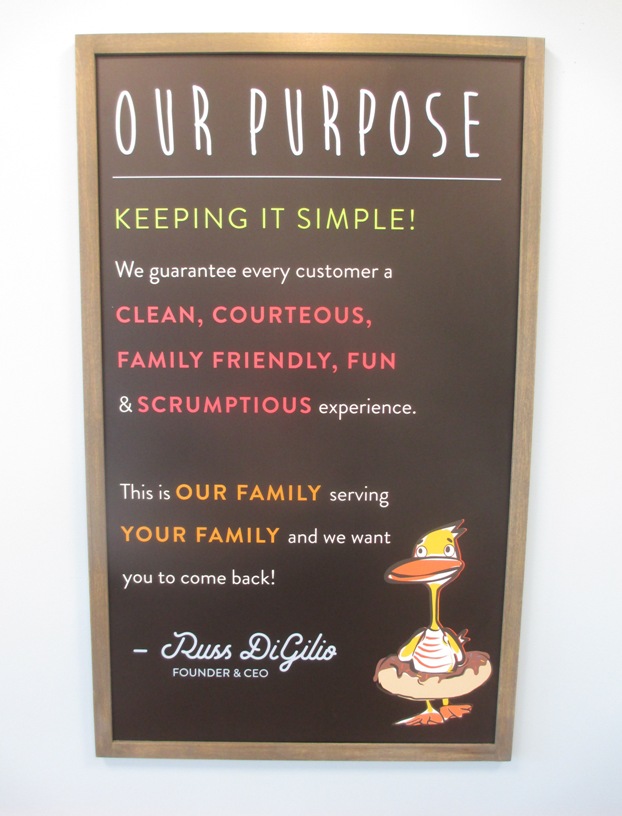
Because we all need a purpose.
During the interview with Gill, customers filter in and are greeted warmly by the staff. Employees behind the counter assist them in the challenging decision of how to coat their donuts, send the brand new donuts through the fryer, and carefully cover them with the requested toppings and drizzles, creating dazzling donut artwork that looks as great as it tastes. All in full view for customers…many of them excited children…to watch.
It’s fair to believe that the experience is rehearsed enough that it isn’t just a show for a writer of a popular magazine. It’s also fair to say the experience is different from well-known large donut chains, who have rested on “acceptable” customer service laurels for decades.
So yes, the quality of service at Duck Donuts is noteworthy. But let’s not discount the quality of the donuts as part of the business plan.
Sitting on the counter is a cake container filled with cinnamon sugar donut pieces, which patrons are welcome to try. Usually the taste results in approval for the complete, paid version, with any of a “duckzillion” combinations of coatings, toppings, and drizzles.
Your fresh and warm donut can be coated with strawberry frosting, Oreo crumbs and hot fudge drizzle. Or try peanut butter frosting, with shredded coconut and blackberry drizzle. And so on. Imagine choosing a dozen combinations like this for your team at work. Imagine your suddenly improved stature within the company as you open the box to display them at the meeting. Can’t think of the right combo? Duck Donuts suggests favorites: maple frosting with chopped bacon (bigger than bacon bits) is beloved of course, as is the Key lime frosting donut with graham cracker crumbs, which is only available in the spring.
When this writer’s arm is twisted enough to try one (resulting in a fairly easy “uncle”), he opts for a breakfast sandwich…a maple covered donut sliced in half, with egg and cheese inside and bacon pieces on top. After some thoughtful consideration of the additional bicycle miles required to work it off, I follow up with the aforementioned Key lime edition.
The verdict? Let’s just say that with Duck Donuts in Marlton now, you’re within an acceptable radius anywhere in South Jersey. Go try them. If you can find a better donut, contact me so I can ask Ken to let me do a story on them too.
The fresh coffee is no slouch either, in case one still thinks that’s a reason to frequent the “leading brand” donut stores.

Well worth a wait in a long line.
Duck Donuts founder and CEO Russ DiGilio simply wanted to make the world, or at least the Outer Banks of North Carolina, a better place.
DiGilio, who at the time owned several assisted living facilities, frequently spent vacations with his family in the resort town of Duck (you see where this is going, right?), which, according to Wikipedia, offers “outdoor recreational activities, summer events and concerts, watersports, fine dining, shopping, art galleries, and a nationally known jazz festival.”
The only thing missing from that list, DiGilio noticed, was a fresh donut shop. And so the first Duck Donuts was born.
Well, okay. Don’t quit your day job thinking it’s that simple. DiGilio and his family spent months developing the right combination of batter and shortening…“from absolute scratch”…and researching the market before opening the first store in 2007.
“There are a lot of different food options out there,” DiGilio notes, “and if someone wants to come up with something, they need a niche. They need something unique, a hook to bring people in. You can’t just be any Joe Schmoe hamburger shop. There’s just way too much competition.
“In our days as kids, going to boardwalks and hole in the wall places, we used to get donuts, and they were made to order. You walked up to the window, they made some donuts and you go on your way. Our reminiscing of times when we were on vacation prompted us to do this in a much different way.”
“Fortunately for us, made to order wasn’t very prevalent.”
Nor did it become prevalent in Duck for the first couple of years after the store’s opening. As every business owner knows, success doesn’t come without a struggle. It took some time.
“The first year out of the gate…nobody knew what we were about. On vacation you’ve got a lot of options. It took word of mouth. The third year was the first year we broke even, that’s when it kicked in and we said this has legs. By the fourth year, we knew we had something special.”
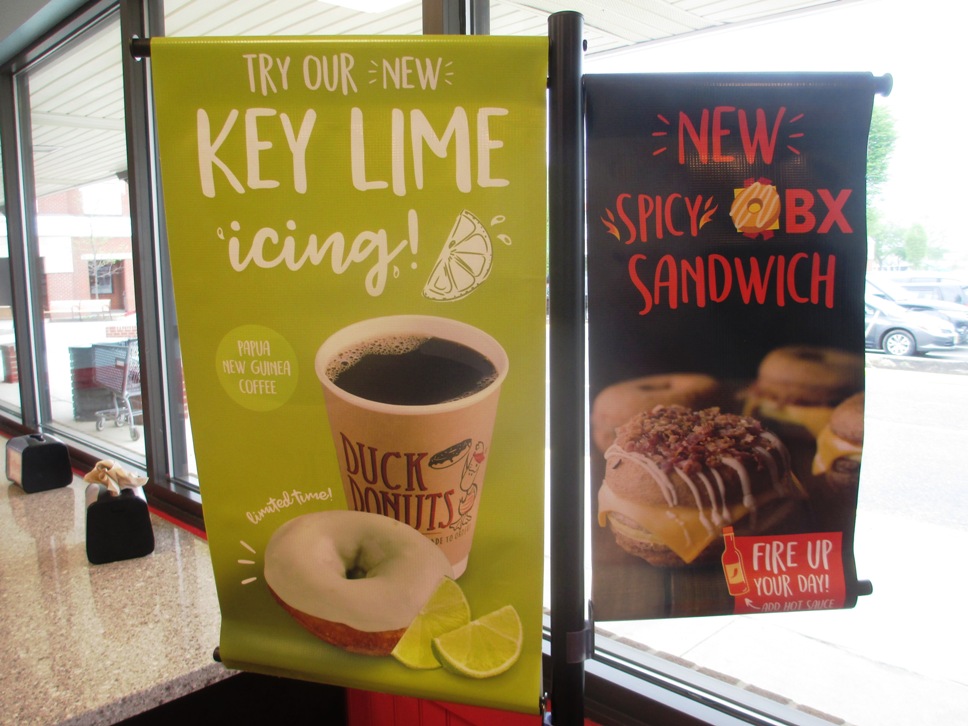
Waiting for spring is even harder than waiting in line, but it’s still worth the wait.
To say word of mouth has been an effective marketing tool for Duck Donuts would be quite the understatement.
It’s one thing to inform your soon to be vacationing friend about the amazeballs donut shop on Osprey Landing. It’s quite another level to repeatedly pester the founder about franchising. Duck Donuts gets so many such offers that there is a prominent page on their website about how to do just that.
“It was surprising to me how much a donut impacted people,” DiGilio recalls, “but when you think about it, the whole idea is family based. People were on vacation enjoying themselves, and it just elicited these memories of while people were on vacation of an enjoyable time.
“It was almost like we had a cult following. We had people write in all the time, telling us how much they love our concept, the donuts were out of this world, and they just loved it. They prompted us, year after year, to come to their hometown or teach them how to do what we do.
“Over time it became so overwhelming that we said, we’re gonna kick ourselves if we don’t test the waters and try to franchise this concept.”
Today Duck Donuts is operational in 13 states, with contracts to open in ten more. The actual number of stores is growing so rapidly that an exact number listed here would likely be inaccurate at press time. There have been 200 locations sold since 2013, with 30 stores likely to open this year alone.
Some pretty impressive numbers in just five years of franchising. But to DiGilio, that first franchise opening, in Williamsburg, VA, is still arguably the proudest moment.
“That couple dipped their toes in the water before anyone else and took a huge risk, which we’re eternally grateful for. But the fact that that store opened with such fanfare and has done so well and continues to this day, in the big picture, set us on our way.”
And if Dunkin Donuts and Krispy Kreme aren’t looking over their shoulders yet, they ought to be.
Did this post make your day a little bit?
I hope so. If it did, I would really appreciate your support.
When you use this link to shop on Amazon, you’ll help subsidize this great website…at no extra charge to you.
Thanks very much…come back soon!
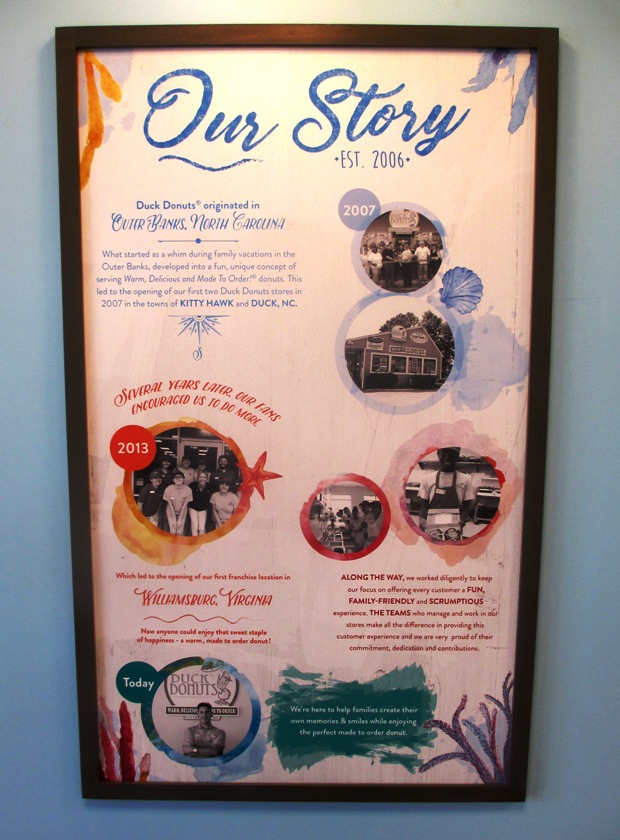
Helping families in more locations all the time.
Quack Gives Back
Duck Donuts didn’t invent the Chemo Duck, as is easy to believe when one initially views the Quack Gives Back page of their website. Which is why the two entities are a perfect fit for each other.
Chemo Duck is a program dedicated to helping children with cancer overcome their fear and anxiety through the inevitably trying therapy. Children are given a “Chemo Duck”, a stuffed yellow duck with hospital scrubs and a chemotherapy port. Parents can use the Chemo Duck to help their children see what their therapy entails and to help ease the child through treatments.
“Obviously what caught our attention was the duck,” DiGilio explains. “Their whole program is based on childhood cancer awareness and education. They’re not really working for a cure, but they are helping the families who are dealing with this type of illness, who need a lot of support and comfort and education.”
This last September (September is Childhood Cancer Awareness Month), all of the Duck Donuts stores gathered together and raised $75,000 for Gabe’s Chemo Duck Program.
“We deal with families, they’re one of our primary customers, mothers with children. This was a nice tie-in, because it’s children dealing with an illness, and they have a duck as their mascot, so it just seemed like a natural relationship. And all families can benefit from what we have to offer and this is our way to give back to those struggling with illness.”
Duck Donuts strongly encourages franchisees to give back, which they are happy to do, through their Quack Gives Back program. The King of Prussia store alone raised over $4,000 for the Children’s Hospital of Philadelphia. “We challenge our franchisees to be connected with their local community,” DiGilio says. “We want our stores to be connected with whomever, nonprofits, baseball teams, high schools, churches, etc..”
If you’d like to learn more about Gabe’s Chemo Duck Program, you can find the website at chemoduck.org.
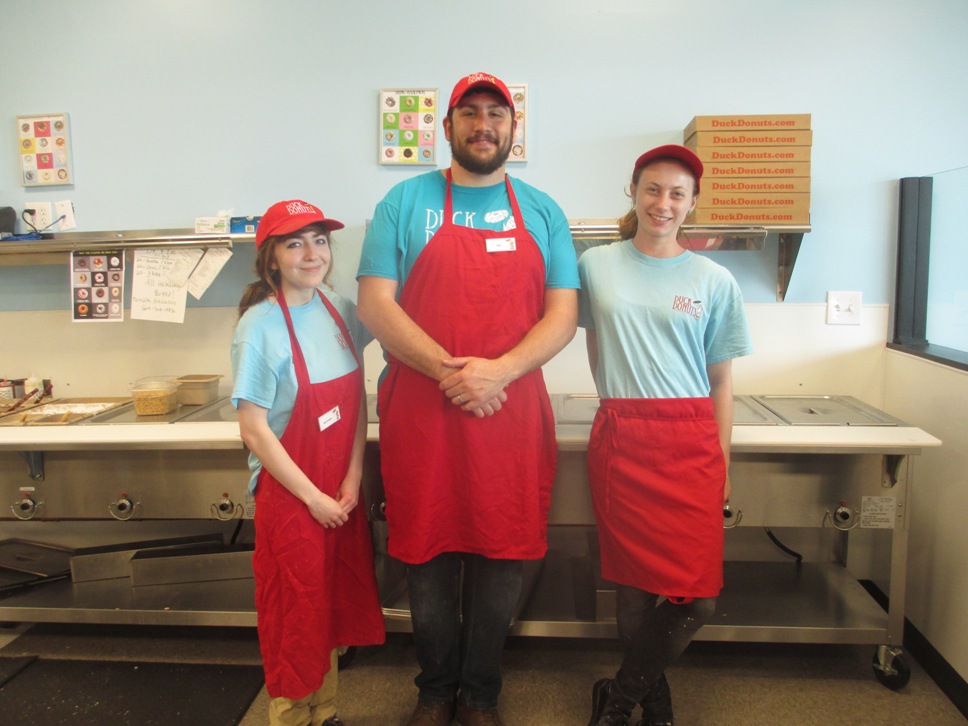
Ted Gill and crew, ready to share their favorite donut flavors.
The Staff’s Favorites
With all of the duckzillion combinations available to choose from, it’s difficult to choose a favorite. But the management team at Duck Donuts is willing to offer their opinions. It’s a testament to the Duck Donuts recipe how even the people running the show sometimes just love the naked cinnamon sugar Duck donut.
Russ DiGilio, Founder and CEO: Personally, when I’m on vacation, I get pretty basic. I like a cup of our coffee, a cinnamon sugar donut and a crossword puzzle. That’s what I do when I wake up in the morning. When I want some fun I’ll do vanilla icing with coconut shredding and raspberry drizzle. Or lemon icing with coconut shredding and raspberry drizzle, they’re my favorites.
Gary McAneney, President: I’m a little more traditional, I just like the lemon with the raspberry drizzle. When I am, on vacation I’ll do the chocolate just with the rainbow sprinkles are traditional. I think that’s one of our best, to be honest.
Kristin Kellum, PR Manager: It’s really simple, but it’s the cinnamon sugar with vanilla drizzle. That warm donut with the cinnamon sugar is just the perfect combination in my opinion.
Nora Branconi, Co-Owner of the Marlton Store: S’mores, which is chocolate icing, graham cracker crumbles and marshmallow drizzle.
Ted Gill, Marlton Store Manager: My favorite is the cinnamon sugar…it’s simple, there’s a million choices you could choose from, but when the warm donut comes out, and the cinnamon sugar sticks to it, it is absolutely delicious. Now, I like all the donuts. The bacon maple donut is delicious. What’s not to like about bacon?

The Jedi Mind Trick: “You can say you love Duck Donuts on Yelp.”
The Critics Rave!
Just a few months into the opening of the Marlton store, Yelp has 37 reviews as of this writing, averaging four stars. Here’s what a few of the customers are saying:
“They don’t make the cheapest donut or the fastest donut, so if you want that, Duck Donuts isn’t for you. But if you want the best donut you ever had, no doubt partially because you got to pick the topping and drizzle on it, Ducks is for you.” – Matt W., Williamstown, NJ
“Trust me when I say you are in for a treat when you come to Duck Donuts. The staff is friendly and the donuts are amazing! This is my favorite donut place in South Jersey!” Nicci G., Burlington, NJ
“I’m so glad you’re a part of the neighborhood. Really. Your donuts are made fresh, on the spot, and your staff is so nice…GREAT DONUTS. GREAT PEOPLE. Thank you!” – Ashley T., Philadelphia, PA
“I had the pleasure of first trying Duck Donuts but from their KOP location. Last year when I found out they were moving into a Marlton location I couldn’t control my excitement. I have been counting down the days to the grand opening and here it is.” – Abigail W., Evesham Township, NJ
“This is a hot new location that will be buzzing for months! Yelp will assist in blowing this up even more and bringing attention to these amazing holes of deliciousness!” – Jason D., Marlton, Evesham Township, NJ
“If you gave this place any less than 5 stars, I don’t think you actually went here. It was busy at 5pm, on a Thursday, in the rain! C’mon people, this place is off the hook. Come one, come all, put all the Dunkin Donuts in the area out of business!!!” – Christopher C., Marlton, NJ
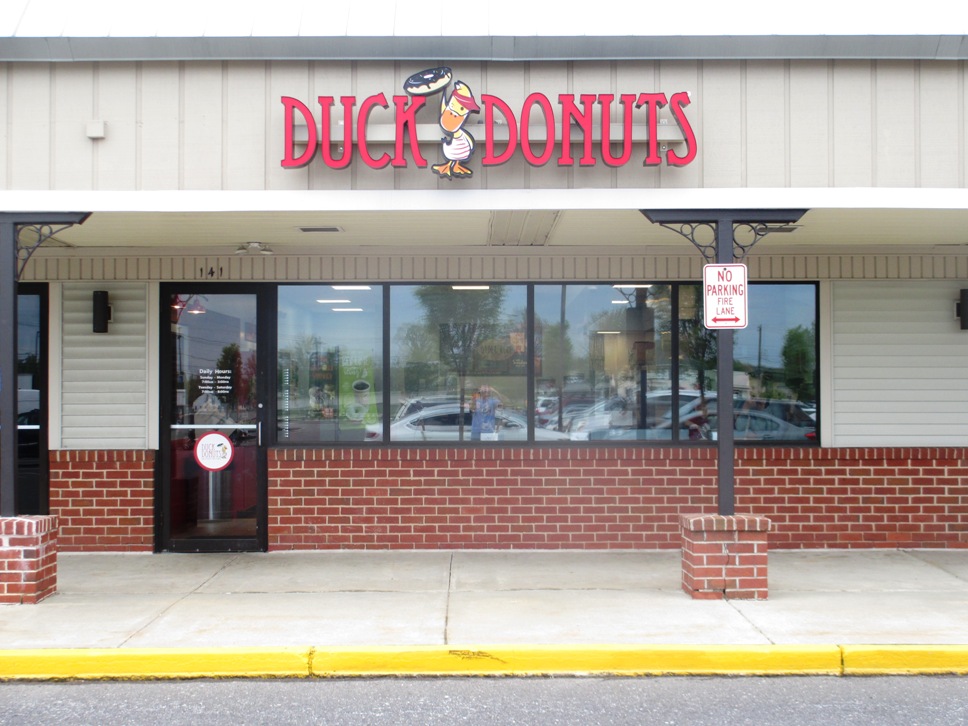
Homesickness factor: zero.
Going Global
If you were apprehensive about a South American vacation because of the absence of Duck Donuts, that’s no longer a problem for you. As this article goes to press, Duck Donuts has recently announced an expansion into the Southern Hemisphere, with ten stores opening in Chile.
According to the official press release, Duck Donuts has signed an international franchise agreement with OBX Alimentos SpA. Their CEO, Marcial Dieguez-Acuna, is quoted as saying “We look forward to having Chileans adopt this new concept with open arms and for Duck Donuts to become a significant player in the sweets industry in Chile. We will offer a superior product to current market standards and with the highest level of quality service.”
Given that the business model is working pretty well in America, it’s not hard to imagine that Chileans will take to Duck Donuts just as quickly. Russ DiGilio says the company is pursuing more international franchising opportunities.
In a few years, you may be able to get a Duck Donut wherever your vacation plans take you.

The New Improved Hospitality Business – Airbnb

Airbnb has experienced some seriously explosive growth since three struggling tech guys rented out their San Francisco apartment during a convention. JerseyMan asked me to tell their fascinating tale and explain how Airbnb became so successful for the Spring 2017 issue. You can view the PDF of the article here.

Yes, with just your phone, you can rent a sweet place like this.
(photo courtesy of FOTOGRAFIN on Pixabay.)
The New + Improved Hospitality Business
Airbnb has made it possible for millions of travelers to stay in residents’ homes all over the globe…and help residents pay the rent.
I reside in Turnersville, NJ, a middle class suburb whose biggest attraction is an auto mall. It’s not exactly a bucket list destination. No one I know takes a vacation to buy a car.
So you can imagine my surprise upon learning that even Turnersville city slickers could earn a few bucks towards the mortgage…just by letting travelers use a spare bedroom.
See, the town actually has something going for it, aside from multi-gigawatt illumination of car dealership lots. It’s a short drive from the city where this nation was born, millions of tourists visit that city, and hotels are expensive and boring.
All a Turnersvillian needs to do is overcome the uneasiness of strangers staying in their home. Easier said than done, perhaps. And that trepidation works both ways. How many people would spend a vacation in the home of someone they’ve never met?
That might sound like a rhetorical question, if the answer wasn’t 60 million. That’s how many guests have used Airbnb.com for their travel lodging since the site’s debut in 2008.
Here’s some exponential growth: Airbnb celebrated its millionth booking in February 2011. Less than a year later, in January 2012, that number reached 5 million. That June they passed 10 million. There might be some calculus-related phenomenon for that line on a graph, but there’s little question that Airbnb has demolished the trust barrier.
The business model is simple enough. Travelers choose from sometimes thousands of residences to rent at their destination, often at far more reasonable rates than local hotels. Hosts can offer the use of a room or their entire home, including the refrigerator and stove, homemade breakfast, free parking, whatever makes the sale.
Both parties benefit. The guest has a greater variety of affordable lodging choices, and the host makes a few dollars to pay bills…no small thing in tourist destinations where the cost of living can be abominably high.
Airbnb’s cut…3% from the host and 6-12% from the guest for each booking…keeps the company going substantially well. With 60 million bookings, that 9-15% works out to…carry the exponent symbol…a boatload of money. (If you want the real number, Airbnb was recently valued at about $30 billion.)
It all started with a couple of young dreamers needing to pay rent. And several air mattresses.
It’s doubtful he planned it that way, but one of Airbnb CEO Brian Chesky’s entrepreneurial lessons is this, which he shared in an interview with Gigaom: “Being broke brings an incredible amount of discipline and focus.”
Chesky and his friend Joe Gebbia, now the CPO of Airbnb…and like Chesky, is now wealthy enough to buy the Yankees…moved to San Francisco in 2007 to create their startup, with no jobs, ideas or money.
That turned out to be key component of a savvy business plan.
Just as the rent was coming due, San Francisco hosted a tech convention that caused all the hotel rooms to be booked. To pay their landlord, the two offered a stay in their apartment on air mattresses, which attracted three paying visitors. You can almost hear the ding of the bulb switching on. Airbedandbreakfast.com was born.
It wasn’t always smooth sailing. Finding investors was difficult enough until they managed to win over Paul Graham at Y Combinator.
When Chesky and Gebbia, and their friend and tech expert Nathan Blecharczyk, needed to fund an eBay-style couchsurfing idea, Graham initially balked for obvious reasons. But he changed his tune when he saw the Obama O’s and Cap’n McCain cereal boxes that the young executives had designed and sold during the 2008 election. Graham was so impressed he even tried unsuccessfully to persuade his VC friends to buy in just on the basis of their drive.
Graham advised the founders…and funded the trip…to visit hosts in New York, where Airbnb had become a popular alternative to astronomical hotel rates. Chesky and Gebbia spoke face-to-face with hosts about their needs.
Ever since then Airbnb has striven to better the user experience in every way, from sending a professional photographer to hosts’ homes (a service Airbnb offers at no extra charge), to allowing users to sign up using Facebook accounts and simplifying the payment process. Airbnb requires verifiable information like phone numbers, and guests and hosts can publicly rate each other.
The timing didn’t hurt. The way had been somewhat paved: by the time Airbnb came along, eBay and Craigslist had already taken advantage of the Internet to make classifieds obsolete.
If eBay’s success has taught us anything, it’s that most of us are decent people who instinctively know that theft and assault is wrong. That’s why exceptions make the news. In the age of Facebook, it’s a great deal easier to learn enough about someone to feel comfortable riding in their car or even buying a car from them. For every story of fake Super Bowl tickets sold on Craigslist, there are a million stories of satisfied users who got something they wanted at a great price or made a profit selling something they no longer use.
It’s called the “sharing economy”, and given the meteoric rise of eBay, Uber and now Airbnb, apparently we’re comfortable with the odds. Airbnb users often gush that transactions often result in friendships and great experiences for travelers and hosts.
That’s not to say there haven’t been some nightmares.
The most notable story is of the Bay Area woman whose home was ransacked by a guest in 2011. She lost cash and valuables, and other items were burned in her fireplace with the flue closed. She was traumatized enough to start an anonymous blog, documenting Airbnb’s failure to address the devastation. It took some bad press, but Airbnb did apologize publicly and profusely and took steps to improve safety, including a damage guarantee for hosts that is now $1 million.
There was also the terrifying ordeal of a 19-year-old man staying in Madrid with a transgender man living as a woman, who locked him in the apartment and refused to let him out until he submitted to a sexual act. The story appeared in the New York Times, describing Airbnb’s arguably insufficient efforts to stop the assault. Airbnb quickly publicized that they would be instructing employees to call the police if they believed a crime was imminent. The victim advised Airbnb users to take precautions, like making the host’s address available to family members.
Those aren’t the only stories of bad actors, but that such tales are rare among millions of stays is pretty impressive. It’s not enough to give too much pause, obviously. But Airbnb also has legal issues to contend with these days.
The hotel industry isn’t happy about Airbnb cutting into their business. They might have a legitimate gripe. Part of the expense of running a hotel is following cleanliness and safety statutes that an Airbnb host doesn’t usually need to observe.
When you think about it, the stay on air mattresses that was the inspiration for Airbnb could arguably have been illegal. Zoning laws in many municipalities prohibit businesses to operate in residential areas, and running a hotel from home might qualify.
San Francisco had been one of the more stringent cities about such laws, even placing eviction notices on the doors of quite a few hosts. New York City, with almost 30,000 Airbnb hosts, has also taken issue with the service, citing a 2010 law that disallows apartment rentals for under 29 days. Lawmakers insisted it wasn’t targeted at Airbnb, but they did fine one host $7,000, a total eventually reduced to $2,400.
San Francisco eventually reconfigured the laws to make hosting legal, once Airbnb agreed to have hosts pay the 14% hotel tax. See, governments can be reasonable.
But the Big Apple continues to be a thorn in Airbnb’s side, recently passing legislation–signed by Governor Cuomo–that imposes stiff fines on property owners who don’t follow housing regulations while renting their homes. Politicians frequently used hot button words like “threat to affordable housing” in their support of the bill; Airbnb angrily accused them of protecting the hotel industry.
Now that they can, Airbnb has armed themselves with a strong legal team of their own, to fight the NYC battles and other regional disruptions that will likely keep ensuing.
As Gebbia was quoted in Inc. magazine, “The car had incredible opponents from the carriage industry. It would have been a big ask to get people to understand them overnight. But their value was proved over time.”
It hasn’t taken long. Every couple of seconds or so, a booking happens on Airbnb, and that interval keeps shrinking as the reputation for trust grows with each successful stay. Occasional ugly experiences and regulatory battles won’t likely stop the juggernaut.
Once one gets past the trust barrier, they’re getting the same deal as in any hotel…a room with a bed and a TV. Perhaps the most appealing part of all is lodging with a true local who…for business purposes…wants you to have a great stay. Unlike a concierge reading from a typewritten list of restaurants, a resident will actually know where to find the best Italian food or ideal parking spot.
Or where to buy a car.
Did this post make your day a little bit?
I hope so. If it did, I would really appreciate your support.
When you use this link to shop on Amazon, you’ll help subsidize this great website…at no extra charge to you.
Thanks very much…come back soon!
Being A “Superhost”
If you get enough positive feedback from visitors to your abode, Airbnb may make you a “Superhost” … the equivalent of an A+ rating from the Better Business Bureau.
According to Airbnb’s website, to become a “Superhost”, you have to, in one year, host at least 10 trips, maintain a 90% response rate, and receive a five-star review from at least 80% of the travelers who use your place. You don’t have to apply for the badge, they will give it to you automatically.
On the website, Airbnb lists some examples of Superhosts and what makes them stand out. One couple in Sydney, Australia put off the sale of their home rather than cancel a booking that they had made; a woman in Rome, Italy always invites her guests to join her and her friends for meals or conversation. Airbnb points out what makes a Superhost: going the extra mile and doing things one wishes hotels would do.
The Superhost gets a shiny badge on their listing showing their status, and there are some other perks too…like a $100 travel coupon for maintaining your status, priority support, and exclusive invitations to product releases and events.
Best of all, potential guests can filter their search to have only Superhosts show up in the results. Kind of like filtering only one-star reviews of a product on Amazon.
“You’re Staying Where?”
Admit it, you’ve probably never stayed overnight in an igloo before. But that’s the beauty of Airbnb…a different style of lodging. But an igloo, you ask? Yes, and check out some of the types of residences that are currently listed on Airbnb:
Igloo – You can stay inside of an igloo by a lake in Norway for $181 a night; the listing says that it can sleep 2-3 people and to bring your sleeping bag. It doesn’t have any reviews, so apparently, the igloo thing hasn’t caught on yet. Airbnb removed a Brooklyn igloo listing in 2016, saying it didn’t meet the occupancy standards. Someone will get it right.
Castle – On the other hand, castles are pretty big on Airbnb…an article on the Conde Nast traveler site listed 11 of them, with stunning photos and equally stunning prices. The Castello Dal Pozzo in Piedmont, Italy goes for $4,029 a night, and the Martello Tower in Dalkey, Ireland brings in $518 a night. If you search for “Airbnb castles”, you can see top 20 listings in France and Ireland alone.
Tree House – Thrillist recently published an article listing the “25 Coolest Treehouses on Airbnb”. #1 is in Atlanta…it’s three separate rooms connected by a rope bridge and goes for $375 a night. Airbnb says it’s the “most wished for listing in 2016”. Others include a luxury treehouse on the Bayou in Baton Rouge, a Bay Area treehouse with a wraparound porch and food delivery, and a treehouse in Swallowtail studios “with 360-degree views of surrounding vineyards. The nice thing is that they all have stairways.
An Airplane – Airbnb was the site for a contest to win a stay in a KLM Royal Dutch Airlines airplane…the plane had been retired from service and furnished with a living room, bedrooms and two kitchens. There were some comical rules to follow, like “No Smoking when the non-smoking sign is on”, and “No marshmallow roasting with the jet engines”.
They offered movies with your stay too…one of them…no, I’m not making this up…was “Snakes On A Plane”.
Eating Your Own Dog Food
Brian Chesky isn’t just the co-owner of Airbnb, he’s also a client.
In 2010 Chesky decided to finally move out of the San Francisco apartment that housed the first Airbnb travelers. To a new mansion? Nope. He spent several years staying with Airbnb hosts in San Francisco and elsewhere.
As he said on Twitter, “I am still homeless (most of the time), and living on Airbnb.”
In other words, Chesky is so dedicated to his craft that he lives it; he stays with Airbnb hosts every night and continues to do what he and Gebbia did in New York City at the start; stay with hosts and learn from them how to improve the experience. In entrepreneur-speak, it’s called “eating your own dog food”.
After all, why buy a house you won’t be in most of the time? Chesky has pointed out that the sharing economy was all about avoiding buying something you won’t use. The average power drill, he is quoted in Traveller as saying, gets used a total of 13 minutes in its lifetime, but there are 80 million of them out there.
Chesky still lists the San Francisco apartment as his primary residence…and incidentally, as recently as 2015 you could still book a $50 stay on the couch.
Missing The Boat
Another of Airbnb CEO Brian Chesky’s tenets for entrepreneurs is “conventional wisdom is overrated”.
Venture capitalists know this better than anyone…they all know the stories of products that no one believed would sell, like the Beatles, bottled water, or a Donald Trump presidency. But you can imagine that even they might balk at the idea of a website that enables people to rent out rooms to strangers for a night. At least until they see how dedicated to overcoming that mistrust barrier these entrepreneurs really were.
Paul Graham saw that…his friend Fred Wilson didn’t. Despite repeated e-mails from Graham pleading with Wilson to at least meet with the Airbnb guys, Wilson reluctantly balked at an investment…the proverbial definition of missing the boat. To Wilson’s great credit, he published his mistake on his blog.
According to Wilson, his mistake was focusing on the idea and not the people. He just didn’t see air mattress stays taking off. Paul Graham, through a series of e-mails, tried heavily to convince Wilson to meet with the founders. Graham believed that Chesky and Gebbia had what it took to become billionaires…a willingness to make an unusual idea work, and to do what it took to make that happen.
Today Wilson still has a box of “Obama O’s” that Chesky and Gebbia created and sold to fund their startup in his office. Why? So he can tell the story to entrepreneurs who don’t know how to raise money for their own startup.
“It’s a story of pure unadulterated hustle,” he says. “And I love it.”
Photo credit: TechCrunch on Best Running / CC BY
Photo credit: sebastien.barre on Best Running / CC BY-NC-SA
Photo credit: Gustavo da Cunha Pimenta on Best Running / CC BY-SA
Photo credit: geremology on Best Running / CC BY-ND
Photo credit: Kevin Krejci on Best Running / CC BY
Photo credit: TechCrunch on Best Running / CC BY
Photo credit: Kevin Krejci on Best Running / CC BY

The Game of Balls – Major League Bocce

Did you know that the game of bocce has existed for over 7,000 years? That’s longer than most religions last! JerseyMan sent me to write about Major League Bocce and the growth of the league. You can view the PDF of the magazine edition here.
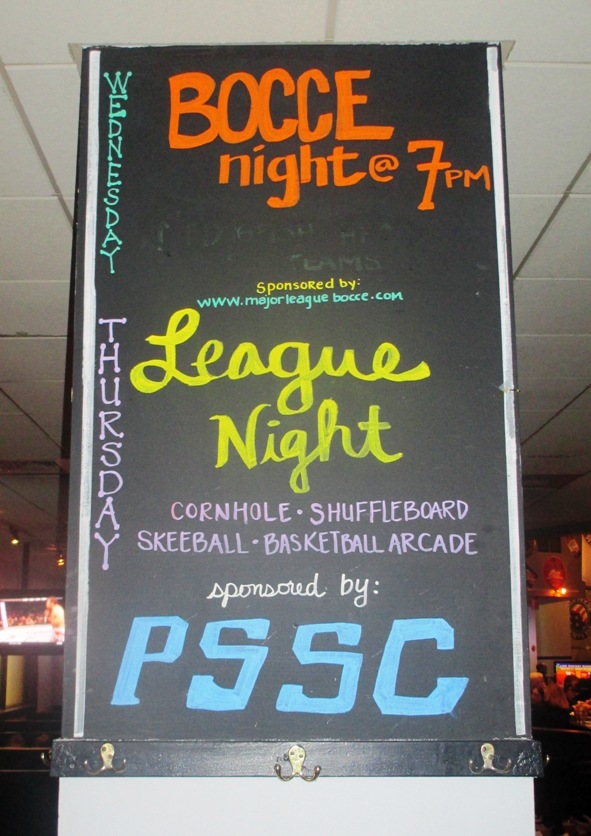
“It’s Bocce Night Everyone!”
The Game of Balls
After 7,000 years, a group of friends finally made obvious what’s so great about the game of bocce.
Listening to Sarah DeLucas, it all started when she and a group of friends were cooped up indoors for a hurricane party. And someone said, “Let’s start a bocce league.”
“Like most great ideas that come about, we were just drinking at someone’s house,” the part owner of Major League Bocce says.
Okay, maybe it wasn’t that simple. This free-thinking group was actually looking for a socializing sport. Something beer-league friendly that players wouldn’t take too seriously. But as DeLucas explains, once bocce was suggested, it seemed obvious.
“I was relatively new to Washington, as were some of my friends. We played in a kickball league. We liked the concept of social sports; it was fun to go do a recreational activity and then go to the bar after games and socialize. But we didn’t really like kickball. There were a lot of rules and regulations that we thought were a little ridiculous. And we were like, we should just do our own thing.
“My friend grew up playing bocce, and he thought we could totally do this, it would be really easy. First of all, it’s very easy to set up, because you don’t need to play on a specific field. Softball, kickball, you need a baseball diamond. Soccer, you need a soccer pitch. Bocce you can fit in any sort of green space and just play.
“Also, bocce is super social, you’re hanging out with everybody, your team, your opponents, you’re all standing around talking. It’s also very easy to pick up. For kickball or softball you have to learn certain abilities, how to throw a ball or kick a ball or bat a ball. People don’t necessarily have those skills.”
Fortunately, there were people in the hurricane room with business acumen too, like DeLucas and her friend Rachael Preston, a possessor of an MBA from the Ross School of Business at the University of Michigan.
“Everyone took on different things,” Preston adds. “My thing was to make sure we had articles of incorporation to file with the city, another partner had taken on starting the bank account, and we had to pay a few hundred dollars to get our permit.
“Then we e-mailed everybody we knew and said, ‘Hey, come play bocce with us!’”
That is how Major League Bocce, the umbrella of official bocce leagues now in ten cities, was formed in 2004; a group of D.C. friends stuck in a house during a hurricane, looking for an activity that would enable people to compete and mingle at the same time. The league website notes that when it came to finding a social sport, “Bocce was the obvious choice as athletic coordination was hardly a prerequisite for play.”
Indeed, when you can hold a beer with one hand while playing (don’t actually do that, though, you could damage the court), you know it’s a sport for the rest of us.

All the equipment you need to play bocce.
Just in case you’re one of those rare folks in South Jersey that doesn’t have Italian roots in your family tree, the rules of bocce can be learned in about ten seconds. Here they are:
1) A target ball, called the pallino, is rolled out onto the court.
2) Two teams take turns rolling balls as close to the pallino as possible.
That’s pretty much it. Oh, there are rule variations; there is an International Bocce Federation that defines regulation court sizes for tournaments and rules about things like what to do if a ball strikes the backboard. Major League Bocce does have its own set of statutes for game situations, obviously. But if a person can grasp those two basic rules, they can play bocce.
A bocce league is like a bowling league. Participants can drink beer while playing, often wear shirts bright enough to direct traffic, and range from every level of skill. But bocce has some key advantages over bowling too…like not having to rent community shoes that are cleansed only with a mysterious spray, for one. Nor is the scoring anywhere near complicated enough to require a computer program; a team gets a point for each ball closer to the pallino than the other team’s closest ball. On to the next round. And after the game, enjoy an adult beverage at the bar.
That simplicity and community is the beauty of it. In just over ten years, the Major League Bocce people have helped make obvious the benefits of a game that has existed for millennia without ever being an Olympic event.
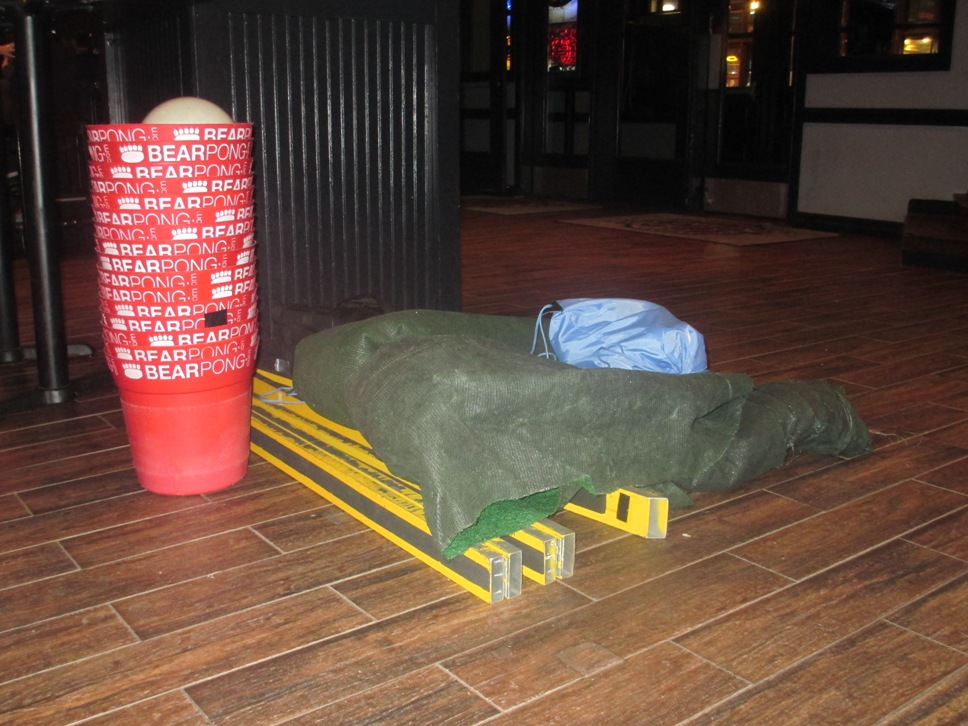
The equipment may be more advanced, but the game remains the same.
For a sport that has never seen a city government hand over billions of taxpayer dollars to build a venue, bocce has some serious staying power.
The first recorded drawings of men throwing balls…well, round rocks, anyway…at targets have been dated as far back as 5200 B.C. in Egypt. Early versions of the game spread through Greece and then Rome in the years of the Roman Empire. The Romans brought coconuts back from Africa for bowling events…arguably the first recorded instance of coconut migration.
In the days before Abner Doubleday, the game of balls enjoyed quite a bit of popularity. Even celebrities of their day like Hippocrates and Galileo were known to sing the game’s praises. There was no restricting factor like social status; anyone with round rocks could play, and so they did.
Much like Elvis, for a time the game was even seen as a threat to society. It had become so popular that nations began to worry that it was weakening their armies…the appeal of throwing balls drew participants away from military exercises like archery practice. Even the Catholic Church frowned on it, citing it as a form of gambling that could interfere with Bingo nights.
But the game was kept alive in Great Britain; there is a legend that Sir Francis Drake once refused to face the Spanish Armada until after a game was finished. Later, Giuseppe Garibaldi, among his many accomplishments unifying Italy, popularized the sport as we know it today. Its growth eventually led to the game being brought to the U.S. by Italian immigrants. The name “bocce” is the plural of the Italian “boccia”, meaning bowl, as a verb.
According to the United States Bocce Federation, there are 25 million bocce enthusiasts in America today. That might be a stretch, but the sport has definitely grown outside of the Italian-American community, the rapidly growing popularity of Major League Bocce being just one example.

Kamali Brooks and Martine Pelletier, two proud Major League Bocce employees.
From its humble beginnings in a Washington hurricane party, Major League Bocce is now in ten cities; other than D.C., Philadelphia and Boston are where it is growing the fastest. There were 1,500 participants in the Philadelphia division in 2015; Preston estimates that 60% of them are returning customers, a number she is confident will grow even larger. “We’re always testing out different things, trying to see what is the most attractive for people,” Preston says.
That expansion took place in just two years, from 2012 to 2014…“we spent 2015 playing catch up”, Preston laughs…and now there are plans to reach into the West Coast.
Players can sign up anytime; each season of the year features a season of bocce. During the spring and summer in Philly, it’s played outdoors at places like Cavanaugh’s River Deck or in Dilworth Park; in the fall and winter the crew sets up indoors at the Field House or Cavanaugh’s Headhouse in Center City. Each season consists of six weeks of regular season play, followed by two weeks of bracket-style elimination playoffs.
Like the owners say, it’s easy to set up anywhere, and there’s always a place to roll and enjoy an adult beverage afterward with fellow bocce enthusiasts. Drinking establishment partners love the mutual benefit too…simply dedicating a space for a bocce court brings in a dedicated group of customers for eight weeks. Beer brands have gotten into the act as well…Dogfish Head is now a major sponsor with the Philly group, making swag prizes another incentive for players.
And it all happened because some Washington natives take their kickball too seriously.

Get your bocce and big screen sports on at the same time!
Preston and DeLucas have quit working for the man and are now full time co-owners of Major League Bocce. It’s been stressful, DeLucas admits, but both are really proud of the growth and success in other cities. It’s doubtful that either of them ever dreamed that finding the ideal fraternizing sport would turn into full time employment. The two have become successful entrepreneurs just through wanting to have a good time with friends.
For centuries, the game of balls has had a way of hooking people like that.
Did this post make your day a little bit?
I hope so. If it did, I would really appreciate your support.
When you use this link to shop on Amazon, you’ll help subsidize this great website…at no extra charge to you.
Thanks very much…come back soon!
Start Your Own Bocce League
Unlike in fantasy sports, where you’re leaving your success in the hands of athletes that have bad days, in a bocce league you have control of your destiny. Major League Bocce enables players with the right amount of “social stamina” to set up their own league. League owners can create a website, post scores and standings, and even activate a system to collect dues. As one league owner stated, “If you can use Facebook, you can run your own league with Major League Bocce.”
The league FAQ lists some tips on setting up your own tournament play, including the equipment you’ll need to set up a court, where to find the best place to play, the number of people in a typical league and a recommended season length. If you need to know more, the folks at the website are glad to help.
And if you’re a bar owner in South Jersey who’d like to bring in some bocce players, give Sarah DeLucas a shout. “I really want to try and get something going in New Jersey; I looked last fall at the Collingswood/Haddon Heights area, but we just weren’t able to get it off the ground. It would be spectacular if someone came to me,” she laughs.
The league website is www.majorleaguebocce.com.
Fanny Kissing Is For Losers
In the 1800s when a version of bocce called “boules” or “petanque” was enjoying popularity in France, the story goes that in addition to the agony of defeat, a woman named Fanny would expose her rear end to the losers, who were then required to kiss her behind.
There are several versions of how the Fanny legend got started. One story goes that she was something of a boules groupie, who let losers kiss her on the cheek as a consolation prize…until the town mayor lost a game. Fanny not being a fan of the mayor, she exposed her rear for him to kiss instead…which he did, as politicians do so well.
Petanque players often use the phrase “being Fanny” for a team that loses a game without scoring a single point. Today there are sculptures or trophies of “Fanny” nearly everywhere that the game of petanque is played, and likenesses of her are often seen in bocce clubs too.
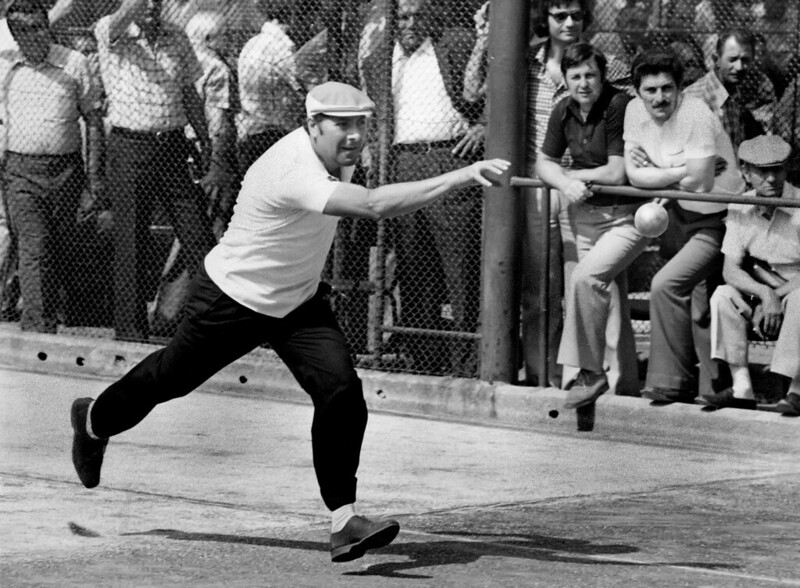
The Greatest.
(photo courtesy Antonio Busso on flickr)
Umberto Granaglia – The Greatest
The late Umberto Granaglia, who passed away in 2008, was widely considered the greatest bocce player ever. It’s hard to argue the numbers: 13 world championships, 12 European championships, and 46 Italian national championships…records all…from 1954 to 1980. He was named “Player of the 20th Century” by the Confédération Mondiale des Sports de Boules, the official governing body of bocce.
The Bocce Federation of Australia’s obituary of Granaglia especially praised his performance in the first ever World Bocce championship held in Australia, in Melbourne. Granaglia led Italy to the doubles championship, soundly defeating France 15-6 in the final. He scored 28 hits in 29 throws in the final game. “A remarkable performance”, the obituary noted.
If you really want to establish your credentials as a bocce enthusiast, get yourself an Umberto Granaglia trading card…you can order one on eBay or Amazon.

Because She Can – Patrice Banks
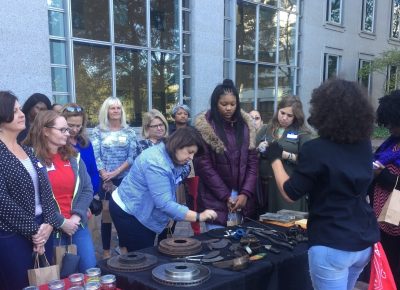
Patrice Banks gave up her six-figure income occupation to start up the Girls Auto Clinic, an auto repair shop run by and for women. Women can get the car fixed and have their nails done while they wait.
This piece appeared in the December 2017 issue of JerseyMan magazine. You can read it on their website here, or click here to see the PDF from that issue.
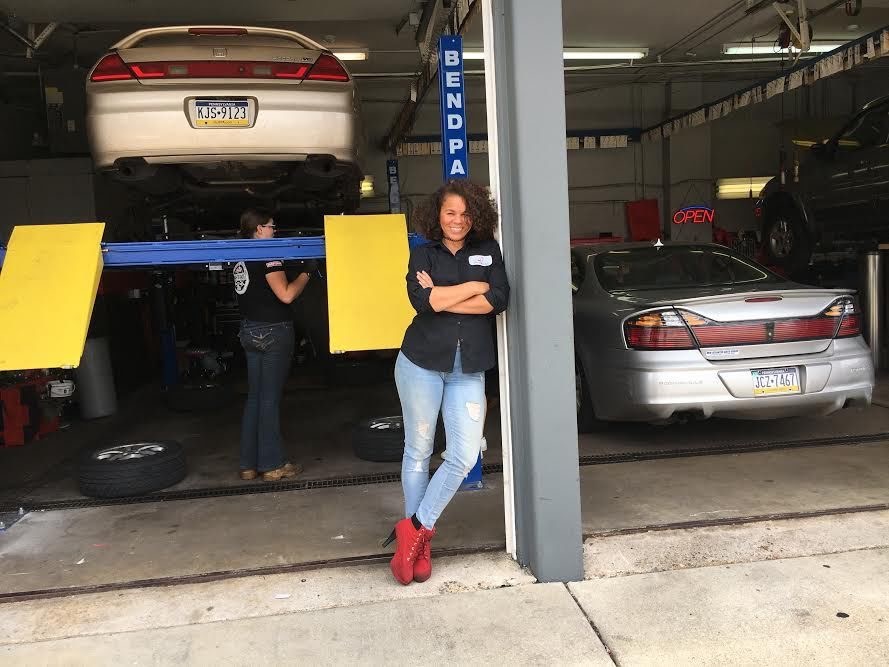
The attractive and savvy Patrice Banks at her auto repair shop.
(Photo courtesy of Patrice Banks)
Because She Can
Patrice Banks, owner of Girls Auto Clinic in Upper Darby, is smashing a conventional wisdom held for generations…that women can’t understand cars.
As we guys know, our women can be astoundingly forgiving sorts. We see it an awful lot with our leaders’ wives. We screw up regularly, and they not only put up with it, they’ll even show support for us in public.
But take advantage of a Philly girl one too many times, and one day she’ll open up an industrial-sized can of whoop-ass on you.
For example, imagine an entire industry neglecting a demographic worth $200 billion a year. That’s how much the fairer sex spends buying automobiles and repairing them. And yet in a 2013 RepairPal survey, two-thirds of them believed they were overcharged for repairs simply because they are women.
Patrice Banks, owner of the Girls Auto Clinic and Clutch Beauty Salon in Upper Darby, knows the feeling. As a former “auto airhead”, she spent much of her adult life dreading—and sometimes dangerously postponing—trips to mechanics for oil changes and repairs. Like much of her gender since the dawn of automobiles, her lack of car knowledge caused her to zone out whenever a mechanic explained a repair. And yes, she has stories about being ripped off.
One day a wormhole opened. Banks suddenly decided to answer a simple question that no one had answered in over a century: Why are females so intimidated by the workings of an automobile?
Answering the question turned into a lifetime mission…to finally answer to the needs of that $200 billion demographic.
At Girls Auto Clinic, women can get their car serviced…and have their nails done as they wait. Nearly all her employees, including the mechanics, are women. The store is popular enough to have a 4.9 rating in 188 Facebook reviews. Banks also hosts popular and free workshops, and maintains a blog on auto repair and maintenance.
She also managed to publish a 300-page book breaking down and explaining cars, titled the Girls Auto Clinic Glove Box Guide. The book openly states that it’s a necessary component of a well-stocked glove compartment. Boastful? Maybe. But in the book, the blog and her workshops, with her simple explanations of why cars need oil changes and what crankshafts do, Banks makes the point throughout: this stuff isn’t that hard. If a former auto airhead can teach it, anyone can learn it.
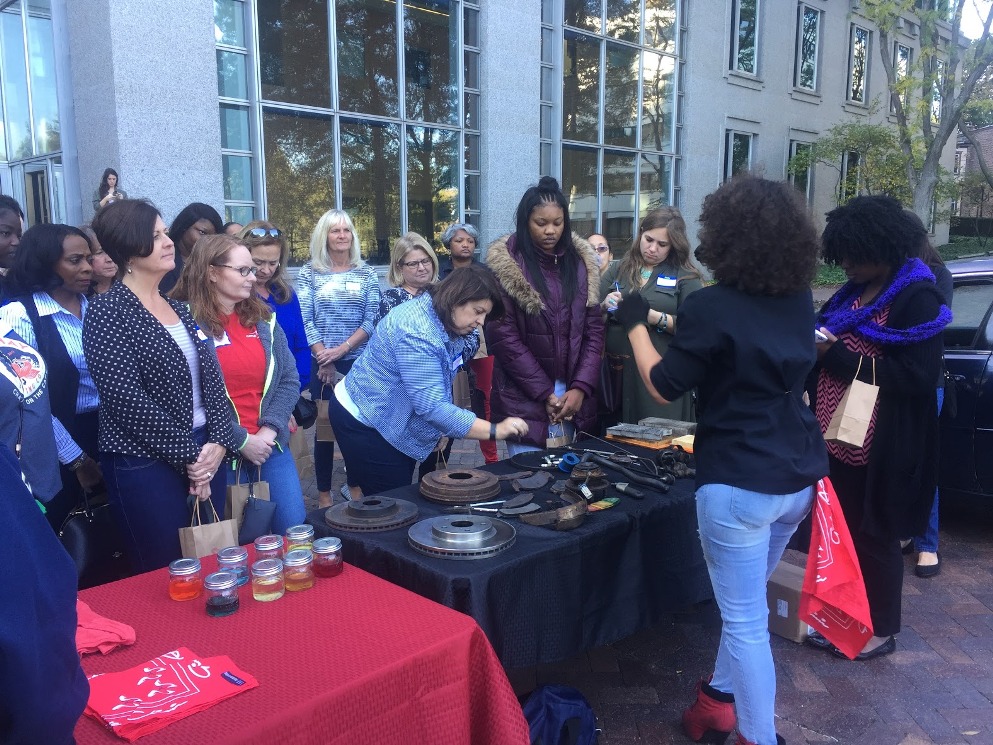
The former auto airhead is now a teacher.
(photo courtesy of Patrice Banks)
If she only desired financial success, giving up a lucrative career and sinking one’s life savings into an untested business model would be an odd route. It’s female independence that drives Patrice Banks.
As the daughter of a single mother—who, as Banks puts mildly, made poor life choices—she saw first hand the need for women to be self-sufficient.
“I didn’t have an empowered mother, which is crazy, because I was always an empowered girl. I always wanted to prove that women could do anything men could do,” she says. “I believed I was bigger than my surroundings. I didn’t want to become my mother. So I was always funneling my extra time into positive things, schoolwork, sports, having jobs.
“My mom didn’t know how to drive, she took the bus to work. I had to ask people for rides home, and I hated being dependent on others. And that has a lot to do with why I’m very self-reliant.”
In her desire for a better life, she toiled for a degree in Materials Engineering from Lehigh University. From there she spent 12 years as a failure analyst and manager at DuPont, where she was pulling down six figures. In other words, she made enough money to buy new cars solely to minimize trips to a mechanic.
In her spare time, she started a blog called “Banks On It”, dedicated to teaching women to do things they generally paid or asked men to do…such as fixing toilets or investing money. As she mined for ideas, she asked every woman she knew what they needed help with the most.
The overwhelming response? Wait for it…“Cars.”
Banks searched for a female mechanic in the area to help her explain automobiles…and came up empty. It was, she says, her “light bulb moment”. The well-paid engineer decided to become a mechanic herself.
She spent evenings earning an Automotive Technology diploma from Delaware Technical Community College. During that time, she offered to work as a mechanic for free…and was turned down at several shops, for reasons like “the boss’s wife won’t like it.” Once she became familiar with the not-so-complicated inner workings of automobiles, she opened her own shop.
Judging from the exposure she’s gotten since, including appearances on Fox & Friends, CBS This Morning, and O Magazine, it sounds like she’s onto something.
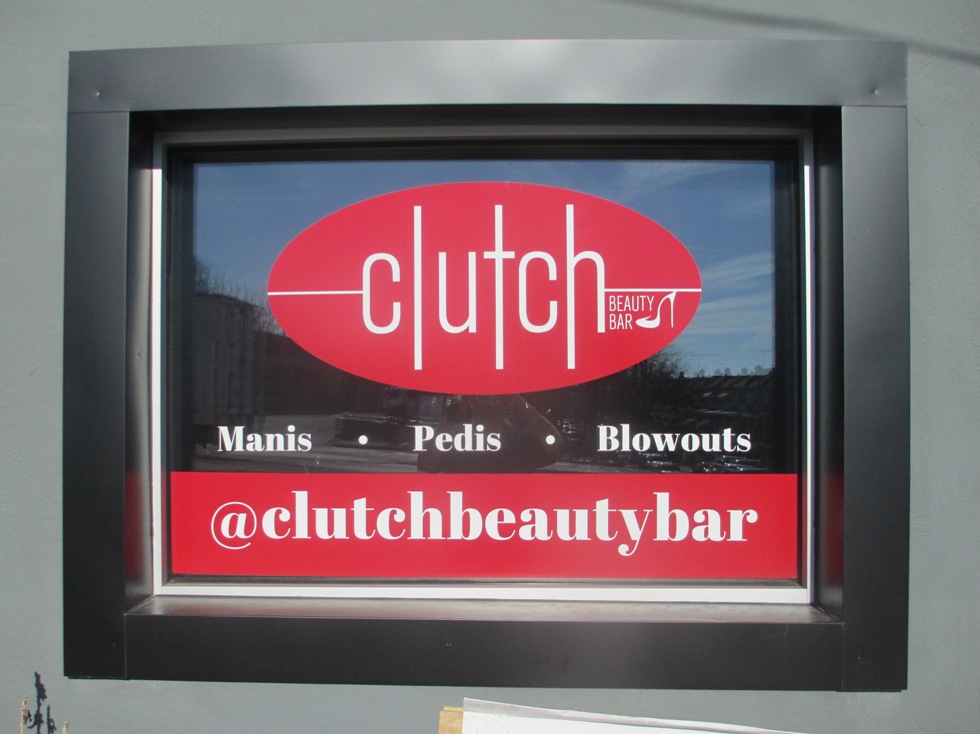
The salon right next door, for hair and nails while you wait.
As Banks wrote in a Washington Post op-ed, 2% of the nation’s auto mechanics are women, and just 13% of car salespeople are women. She drove home the point: “it’s easy for us to feel misunderstood and mistreated by the auto business when we don’t see ourselves reflected in it.”
“We need to have more women in the industry that we can interface with, that we can talk to about our cars,” she says. “Women would rather deal with a woman because we know what they go through. We have women that come from miles away, they don’t even care about our certifications, they trust us to work on their cars because we’re women. That’s how bad it is.”
As an example, she cites unnecessary “upsells” like filters and flushes that shops peddle to less car-savvy customers. “They do need to be done, but they only need to be done at certain times. You don’t need an air filter every oil change, you need one maybe every other oil change.”
She unequivocally states that it’s ingrained. “It’s become this culture, because of the way that the business model is set up. I see people being told they need new brakes when they don’t. I see that all the time. When I went back to school, I realized what’s really necessary. We’re not going to upsell, we’re going to offer you a fair price.”
And if you’re marketing to women, it doesn’t hurt to have a beauty salon as a waiting area. The Clutch Beauty Bar is humorously auto-themed, with toolboxes at each station and a sink constructed from a wheel. It’s a place where women can get “manis, pedis, and blowouts” as their oil is being changed.
The customers love it. As Lorie “Lulu” Tisdell gets her toenails painted, she gushes excitedly about GAC, pointing out the toolboxes and hanging extension cords in the salon and sharing her story about finding the place during a snowstorm. Lulu has been a loyal devotee since the beginning.
Even more so, Banks’s employees are appreciative. As Colleen McClure works the front desk taking calls and speaking with customers, she shares how she worked for years at a hydraulic shop and turned wrenches at other independent repair shops. She offers a simple explanation why she quit: “I was treated like s***.”
It’s an obvious business model. But an industry that spends millions coming up with car names like “Probe” and “Cruze” somehow missed it.
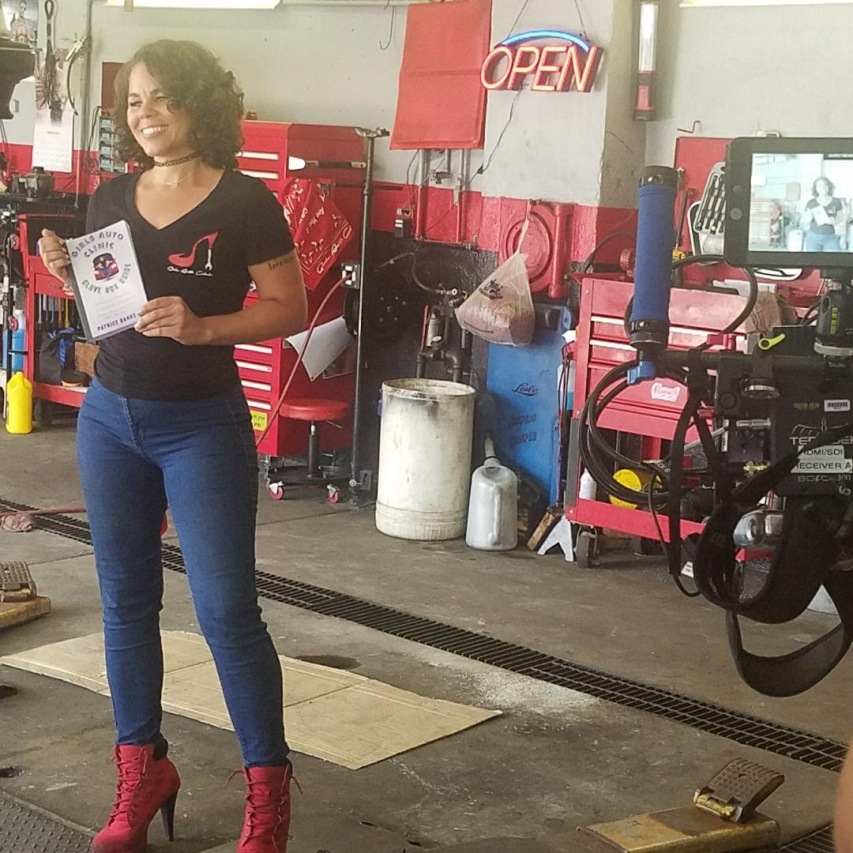
Patrice with her book, an easy, enjoyable read.
(photo courtesy of Patrice Banks)
It’s actually difficult to imagine Patrice Banks having difficulty persuading a man to fix her car. She is easily personable, bubbly but never overbearingly so, and decidedly easy on the eyes.
Away from a camera or microphone, her humility stands out far more than her trademark spunk. She can even be seen decorating a Christmas tree in the shop. “I always look forward to decorating until I’m actually doing it, then I realize this is hard work,” she jokes. When talking with Patrice, one never gets the impression that she considers herself superior.
Which, when you think about it, makes her a perfect fit to appeal to a demographic whose pet peeve is feeling condescended to by mechanics and salesmen.
Ask her what her proudest achievement is and it’s not being featured in Oprah’s magazine or on national TV. It’s her success in what she set out to do…help women in an arena where they have been neglected, and given the amount of money they spend, profoundly underappreciated. There have been difficulties, to be sure, but Patrice Banks has no doubt that this is what she was born to do.
“With any startups, you make a lot of mistakes that cost you a lot of money. Everyone will. I tell people, I fail every day, and I look forward to it, because it gets me closer to winning. Small businesses make dumb mistakes, big businesses make dumb mistakes and it costs them millions. I’d rather make them now when I’m small.”
There is nothing small about the impact Patrice has had on her employees especially. “Since my shop opened, my mechanics have come to me and said this was the best paying job they’ve ever had. And that makes me feel good, to be paying women well, to help their families, particularly in a profession that they’ve struggled in and been kicked out of.
“That to me is my greatest accomplishment, and I’m grateful.”
Did this post make your day a little bit?
I hope so. If it did, I would really appreciate your support.
When you use this link to shop on Amazon, you’ll help subsidize this great website…at no extra charge to you.
Thanks very much…come back soon!
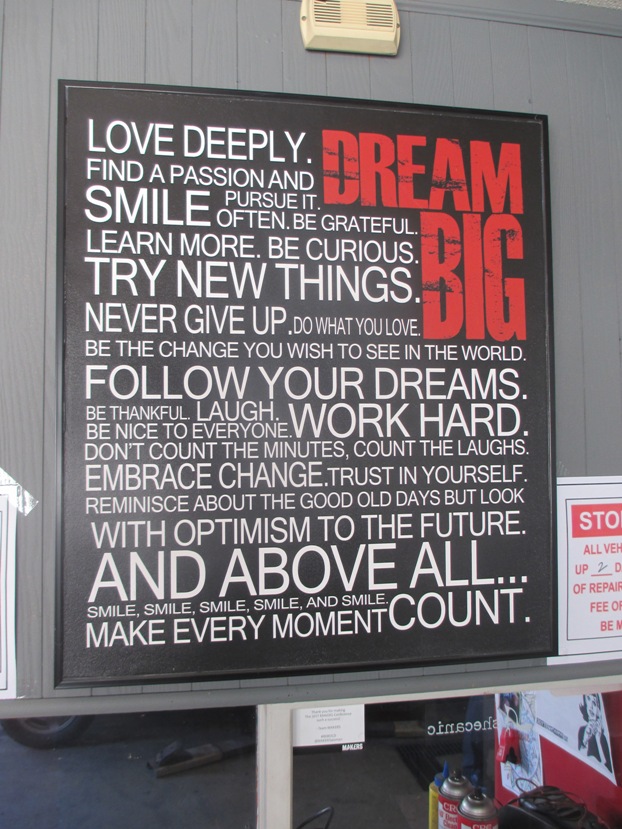
It’s actually all common sense when you think about it.
You Turned Down Who?
Despite that every day she has to ensure that customers keep coming to the shop, Patrice Banks has turned down opportunities for publicity that struggling entrepreneurs would die for. Imagine rejecting offers to appear with Rachael Ray or Ryan Seacrest, or even a chance to show America your business on “Shark Tank”. But she’s learned that national exposure isn’t always a good thing.
“Press isn’t always cracked up to what you think it is,” she explains. “And one of the reasons is that there’s too much content. Everyone’s looking for content. I would be excited at this network coverage, and they would do the story and I would be on TV, but all I have is my shop, I can’t reach someone in California. So it wasn’t translating into sales.
“We were having people come here and shoot all day, five or six hours, but some people would like my page and that was it. I couldn’t convert it into buyers. It started to become a distraction, because I had nothing to sell to a national audience. People would want me to franchise, and I just can’t yet. It wasn’t an advantage, because I wasn’t prepared for it.
“Rachael Ray and Ryan Seacrest, they all wanted to have me on before my book came out. The problem I have now is, now that I have a book to sell, the old press are saying, well, we’ve already done a story on you. And new press is saying, well they did a story on you.
“But you don’t know these things starting out. You’re all like, it’s great, and you can talk about it, but you realize that’s not always the best way to go about it.”
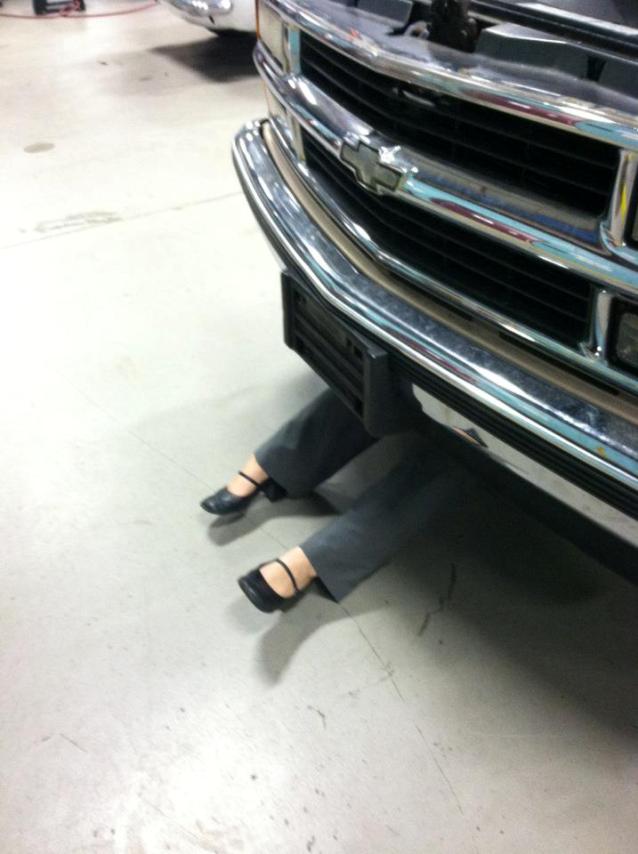
The trademark heels.
What is a #SheCANic?
Part of Patrice Banks’ dedication to helping females is by turning them into “#sheCANics”. The term, in her words, describes “a female of any age who has mastered the mechanics of ‘yes I can’ and uses them to get to ‘yes I did.’
On the #sheCANic page of the Girls Auto Clinic website, women can read a blog full of car tips, find out when and where Patrice will be giving her next workshop, or join a Facebook community of over 9,000 members where they can have their car questions answered.
The blog is full of posts directed at women…with titles like “Alternators Are Like Cell Phone Chargers…” or “Does Your Car Have Boogies?” But they are ultimately serious and simply explained posts designed both to help women take better care of their cars and also to realize that these things are easy to understand.
The #sheCANic logo includes the red heel, a part of Banks’ signature look that happened by accident. “I had to go right from work to school,” she told Oxygen.com. “At work I wore slacks and heels. At school we had to wear dirty clothes, so I mixed them up. One day I was under a car pulling out a starter, and someone took a picture of my heels sticking out. It was perfect.”
Incidentally, no, Patrice doesn’t work on cars with her heels on. Nor, she says in her book, does she recommend doing so.

Respect, Integrity, Trust – JDog Junk Removal

JDog Junk Removal recently opened their 200th franchise in the Boston area; BostonMan magazine asked me to cover the milestone. (You can view the magazine article here.) I spoke with owner Jerry “JDog” Flanagan and his partners about the company and their brilliant business model. (See JDog’s website here.)
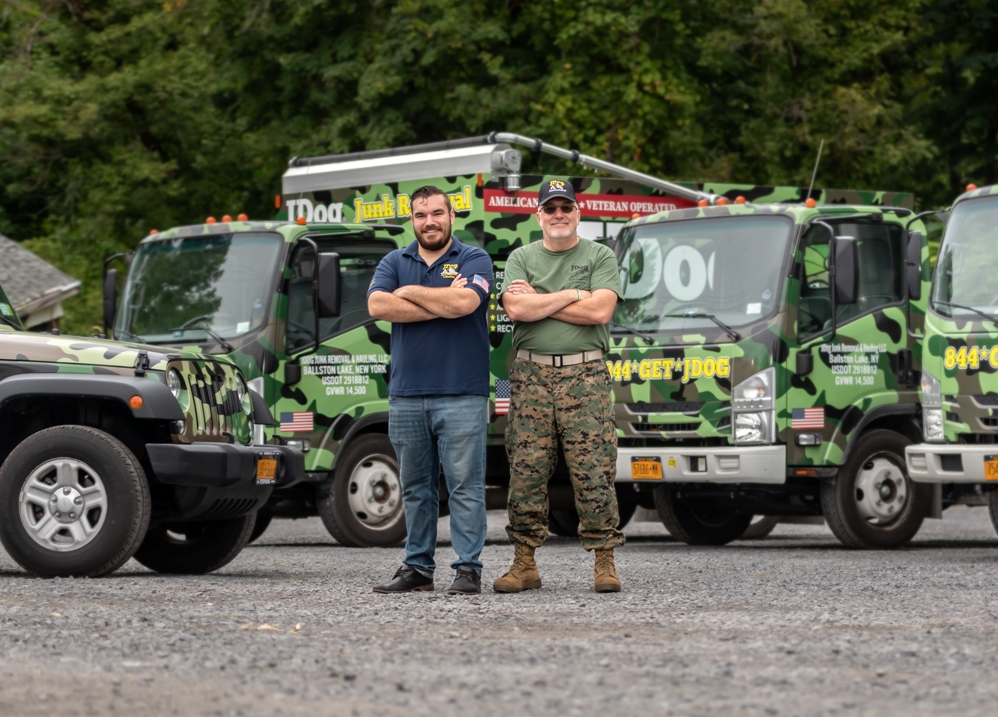
Respect. Integrity. Trust.
JDog Junk Removal is opening their 200th franchise here in Boston…and they’re bringing their military-inspired values of respect, integrity and trust with them. Those values have inspired a pretty stellar business model.
The idea of hiring veterans doesn’t need to be sold to business owners as a gesture of gratitude for their sacrifices. But there’s another very good reason. It’s great for business.
If you have any curiosity why, listen to R.J. Gagnon, co-owner of JDog Junk Removal’s new Boston franchise, tell you about Crazy Keith.
“When we interviewed him,” Gagnon says, “he needed help. We had a couple of concerns. Obviously he was a little older than most of our guys, doing this very physical job. And he was a Vietnam vet that came with his own set of troubles and conflicts.
“So the first thing we did was make sure that we found him a place to live in the area. We found him an apartment, and we helped him get established and get into programs to help him.”
R.J. and JDog needn’t have worried.
“This Vietnam War veteran, he rides his bike from his apartment to the bus stop, gets on the bus, rides into the city the hub is in, has a bike stationed at that bus stop, jumps on that and rides into work, repeats the process home, and repeats the process day after day.
“He is never late, he never calls in sick, and he works harder and faster than any 20-year-old on our crew. He has a nickname, Crazy Keith, because when they get done with a whole house cleanout, panting in the hot sun, Keith is still doing somersaults and flips and starting to stretch out with his martial arts moves. Those military values of completing your mission? That’s what he lives and breathes.”
Incidentally, that rubs off on team members.
“He is like a role model to some of the younger civilian guys. ‘How is this 62-year-old Vietnam vet out-hustling me? I’m 20 years old and he is out-maneuvering me out there!’”
R.J. Gagnon’s father, Ray, is a retired Marine Corps Master Gunnery Sergeant. The two are taking command of JDog’s 200th franchise, located in the Framingham/Worcester area. The growth of JDog, which originated in Philadelphia, has been swift and decisive…in no small part because of their hiring and franchising practices.
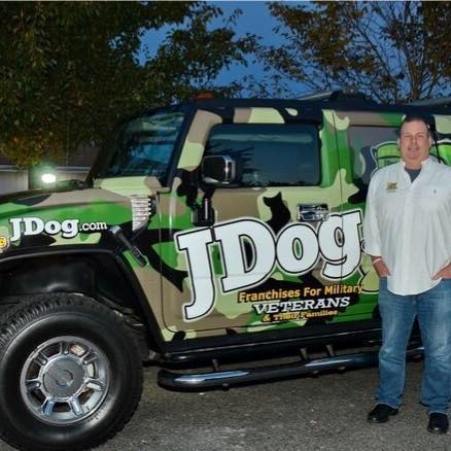
Jerry “JDog” Flanagan, making a difference for those who’ve made a difference for us.
Jerry “JDog” Flanagan, co-founder and CEO of JDog, was a wire dog in the Army, hence the nickname. He has never needed to be told the value of employing someone who has served in the toughest of environments. He knows the work ethic ingrained in a military uniform.
“You’re 100% accountable for your actions,” he says. “You learn how to respect people, you learn how to say yes sir, yes ma’am. And your work schedule is out of control. You’re going to work more hours than you’ll ever work in a civilian job.”
It was great life training for the workplace. “I was able to get to work before everybody else, I stayed later than everybody else, I volunteered for all the crappy shifts. It separated me from the average civilian.”
Flanagan learned, as most entrepreneurs do, that his work habits would better benefit his family if he owned the business himself.
With his wife Tracy, he started a kids party center in 2007. It went under in the recession of 2008. Without a college degree, he needed a better way to support his wife and daughters, so he researched recession-proof businesses. One of them was junk removal.
He started handing out postcards offering junk removal service to neighbors. The ones that hired him were immediately impressed.
“I had been doing it for about two weeks, when someone mentioned that I was doing the job so fast and on time, and I was in a polo shirt and was clean cut. They wanted to know where this came from. I said, well, I was in the military, so I’ve always been able to outperform anybody because of my work ethic.
“They said, ‘You should market that!’ So I slapped ‘Army Veteran’ on my business cards and stuck it on the side of my jeep.”
The response immediately showed that he was onto something. “The phone started blowing up and everyone started using me in the area. I lasted probably eight months, and I realized that I needed helpers.
“I went to the VA, and I hired compensated work therapy patients that were struggling with drugs and alcohol. Combat veterans that were coming back and couldn’t find work. I was rotating different guys into my trucks, putting them on the other side of couches and carrying items.
“They felt great about it, and we were able to run the business with almost all veterans initially. I realized that we had something big here, and my wife said we should franchise this thing. We sold five franchises, and I realized other veterans wanted to be part of this.”
As Flanagan says, it’s a hand up, not a handout.
“It’s not just about philanthropy. These are real businesses. They make real money, real equity for families. When you have that and you have fun doing it, and you’re putting veterans to work, and the community’s getting behind you…it’s just a recipe for massive success.”
His customers “just have a lot of respect for military, either side of the aisle, it doesn’t make a difference. I had no idea that it was going to be that powerful. I didn’t realize that the competitive advantage of being a military veteran business was that strong.”

Camouflage makes for some stunning logo artwork.
So why don’t more veteran-owned businesses trumpet military service, such as with the stunning camouflage-painted trucks like JDog uses? Gagnon thinks it’s a reluctance to use their service for personal gain. A reluctance that both he and Flanagan believe is misguided.
“I see it as a way to communicate that we’re respectful, that you can trust us, and that we carry ourselves with integrity,” Gagnon says. “Veterans became different people the moment they signed up. They’ve served everyone, and that brings with it some weight and value.”
Flanagan agrees that it’s an unquestionably impressive credential.
“The way I equate it is this: if you went to get your MBA at Harvard or you graduated MIT, what are you going to do? You’re going to put that on your LinkedIn, you’re going to put it on your resume, you’re going to let the world know, right? Well, veterans don’t do that, and veterans need to, because you could equate it as something similar of an accomplishment.
“There’s veterans out there that own a business, you’d never even know they’re a veteran. They’ve gotta figure out how to get their brand out there, because it really works.
“Customers are longing for someone to open the door up in their home, and say thank you, good morning sir, look them in the eye, do a really good job and have respect, have integrity and have trust. And the company was founded on respect, integrity, trust.
“They’re going to use us over and over again. They’re going to tell their friends and family. They tip us, they make sandwiches, they leave their doors unlocked for us to go in when they’re not home. It’s insane. There’s not one other service model out there, plumbers, painters, you always feel like you’re getting ripped off. In our case, it’s the opposite.”
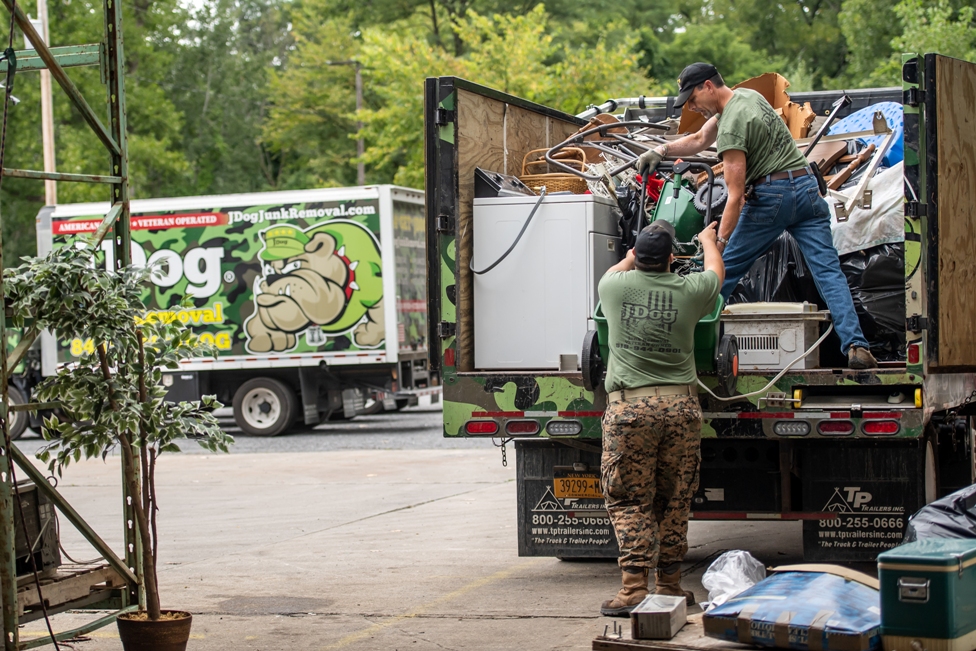
JDog has an effective recycling program as part of its business model.
JDog is not only a phenomenal success story for veteran employees and franchisees, they’re a tremendous boon to communities they serve, both by helping local veterans and protecting the environment.
Between 70% and 80% of what JDog collects, according to Gagnon, never reaches a landfill. They use a process R.J. calls the three Rs: re-purpose, re-sell, or recycle. Still-usable items, such as furniture, get donated to charities helping veterans in the area. For items that are re-sold, proceeds go to funding charitable functions. Other items get recycled, including paper, cardboard, glass, plastic, wood, and metal.
Everyone benefits. “Those programs are part of the reason why they decided to go with JDog. People know that it’s not just a junk removal company. We’re actually doing something good here.”
Their 200th franchise in the Cradle of Liberty, while obviously momentous, is just another stop on the freeway. JDog has signed on for 300 more franchises, including a few more in the Boston area.
In the space of just a few years, Jerry Flanagan and his warriors have built an extremely lucrative business with one simple premise…that military values of respect, integrity and trust bring an almost unbeatable competitive advantage to an enterprise. More importantly, Flanagan, his wife Tracy, and his business family like the Gagnons, have found a calling.
“The model that started out as a way of survival has turned in to a massive inspirational company that’s changing families and lives,” Flanagan reflects.
“We’re bringing veterans back together under one ethos of brotherhood. And that gets me up very early every day. It just doesn’t stop, because if there’s a veteran out there in the United States, my obligation is to put them in business wherever they are in the country.”
Judging from JDog’s astounding growth, it looks like Americans are on board with the plan.
Did this post make your day a little bit?
I hope so. If it did, I would really appreciate your support.
When you use this link to shop on Amazon, you’ll help subsidize this great website…at no extra charge to you.
Thanks very much…come back soon!
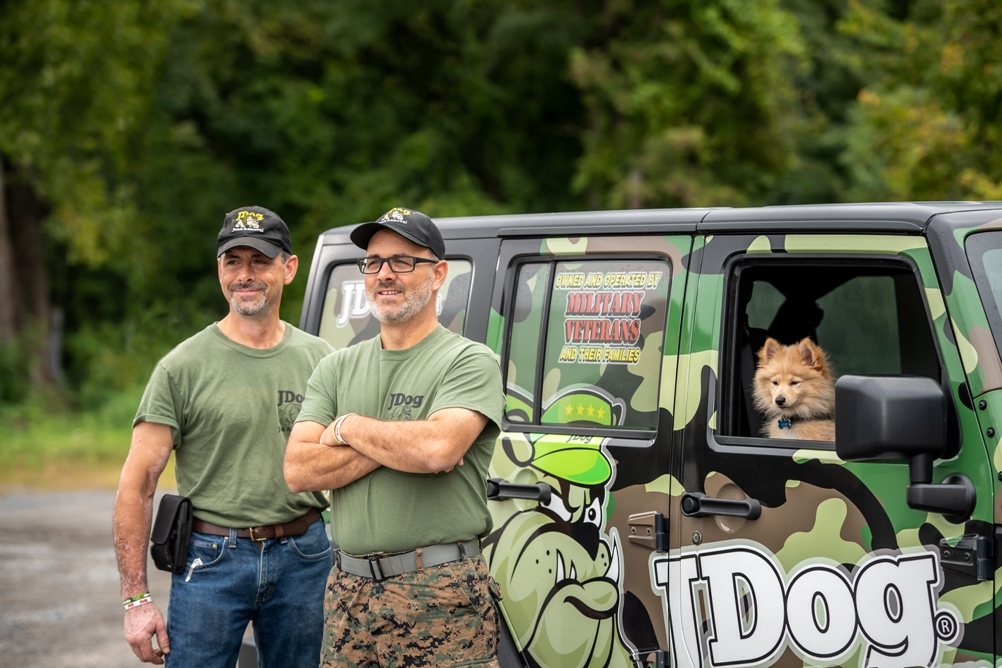
A great deal for military members and potential business owners.
Own A JDog Franchise
JDog is offering franchises by the truckload, but their focus is franchising to military veterans and their family members. Having a DD-214 or being an immediate family member who can show a DD-214 is a must. They also take a good look at a prospect’s finances, conduct multiple interviews and introduce them to their staff.
But if you’re a veteran looking to run your own show, it’s a great deal.
“Basically we wind them up and let them do their thing in their markets,” Flanagan says. “We’re not killing everybody over small stuff, as long as they’re running their operation properly.”
Gagnon, whose strength is marketing, understands the benefit of such creative control. “We’re empowered to make the business decisions that we have to make that make sense for our business and our territories, which you don’t get with a lot of other franchises.”
Flanagan also believes in rewarding the ones that do well over time. “We have a flat, scalable royalty. What that means is they pay a flat royalty a month regardless of what their sales are. So if they’re doing higher in sales, they keep those proceeds, they keep the recycling dollars, they keep the re-purposing and reselling dollars, which allows them to expand and reinvest back in their own territories.
“A lot of these guys are getting fees for their call centers, their routing systems, their website, their PR. We don’t charge for any of that stuff. That’s all part of the franchise, which makes it very, very affordable.”
If you’d like to find out more, there’s a separate page on the JDog website dedicated to franchising, including a video of the benefits. It’s at https://www.jdogfranchises.com/.

Offering a hand to the heroes of the future.
Giving Back: The JDog Foundation and Military Spouses
JDog is philanthropic by nature, donating furniture and usable goods to veterans in need and using proceeds from recycling for charitable events. But now they’re giving back to America’s finest too, with the recently formed JDog Foundation.
The JDog Foundation’s mission is to “provide leadership, support, awareness, and funding to Veteran Organizations that are charged with rebuilding or repairing homes and lives for our Veterans.”
They’ve landed a good representative to head the foundation…Ralph Galati, a former POW who was captured when his plane was shot down and landed in the Hanoi Hilton with John McCain. He was released in March of 1973, just after his 25th birthday. Galati is the former Director of Veterans Services at St. Joseph’s University in Philadelphia.
JDog franchise owners also benefit from Tracy Flanagan’s Military Spouses program, the group of women supporting their business owner husbands. Tracy writes a newsletter and manages the group, Jerry says. “It’s just supporting their franchisees out there through the women, who really run the operations and the houses behind the scenes, really.
“We all have to answer to somebody and it’s those women out there that are really strong.”
If you’d like to find out how to contribute to the JDog Foundation, it’s at https://www.jdogfoundation.org/.
(all photos courtesy of Jerry Flanagan and JDog Junk Removal.)

Accessorized – Tricked Out Custom Cycles

JerseyMan sent me to interview Steve Kehler, the owner of Tricked Out Custom Cycles, for the October 2015 issue. Steve is an affable, funny guy, and it was an enjoyable interview. And he and his team do some truly badass motorcycle artwork. You can view the PDF of the magazine article here.
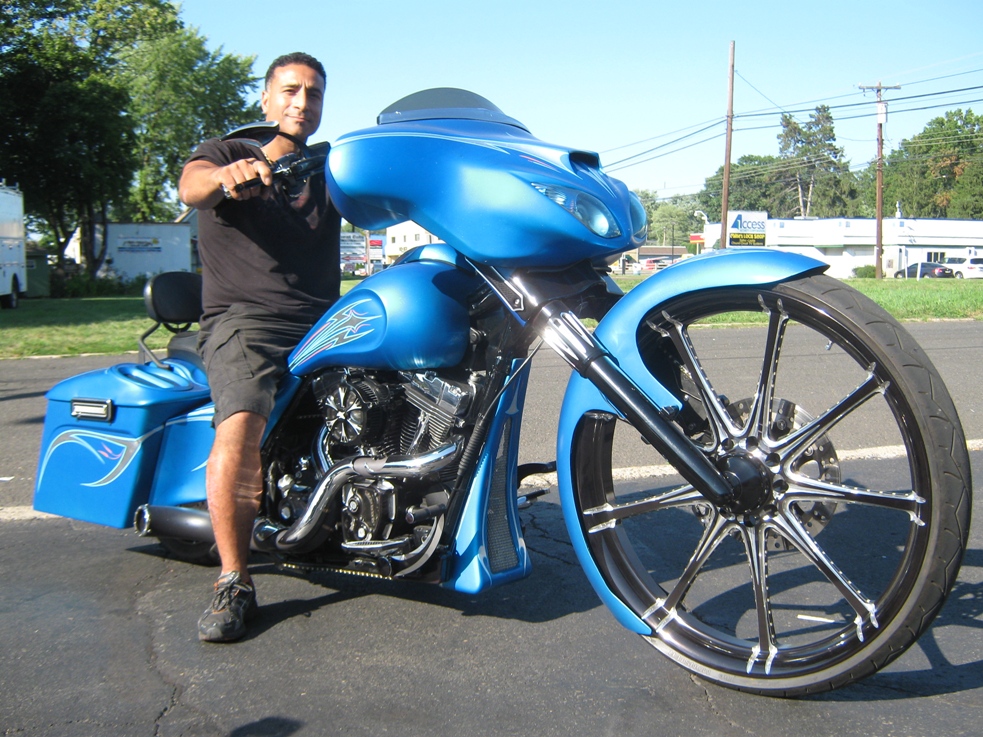
Steve Kehler, owner of Tricked Out Custom Cycles.
Accessorized
Steve Kehler accepts reality, even when it’s not reality.
The owner of Tricked Out Custom Cycles in Warminster, PA has enough of a reputation for building and customizing motorcycles that in 2007 he was featured on ESPN2’s “Metric Revolution: Motorcycle Build Off”, a reality show competition.
Kehler’s entry in the contest…the stunning Egyptian-themed “King Kawasaki” that is featured on the front page of Tricked Out’s website…took him four months to build. King Kawasaki took third place in the competition.
Which, as Kehler learned, was about the best he was going to do.
“I was under the impression it was gonna be ‘let the best man win’. The reality was brought to my attention very soon after the filming. I came in third on the sport bike side, only to find out that the first two people didn’t even build their bikes.
“They had us filming in Red Rock Canyon. We were going up and down the same mile, changing camera angles, splashing water on our face. It was all propped, all fake. The builds weren’t, but when you find out other people didn’t do their builds, it was like, what kind of a competition are you doing?
“It by no means depicted what reality was behind the scenes. I bet if you talk to every one of those builders, they would all say the same thing. Some of them put in their whole heart and soul…and finances…to impress everybody, and came up shorthanded. I was told that whoever brought the most sponsorships was gonna win the show.”
Sour grapes? Not at all. Kehler is, after all, an entrepreneur. And being featured in a “reality” show competition is great publicity for a business.
“Listen, it’s entertaining,” he says. “The first thing they will tell you when you get involved in the TV show is, this is entertainment. It’s about ratings and if you don’t like it, don’t be involved in it. At the end of the day, being on TV, being in magazines, being in any type of media publication is great advertising. I’ll take it all.
“I usually tell people I let my work speak for itself, if you like what I do and you would love for me to do something for you, I’m all ears. That’s reality.
“We don’t have to film it!” he says with a hearty laugh.

An attention-getting piece of motorcycle artwork.
Kehler laughs a lot these days. He is a cheerful, likable sort, clearly content in his chosen profession. To listen to his story, it’s as if he were born to customize bikes. Especially when his outspoken personality clashed with car dealerships, where he was employed as a mechanic and service writer.
“I’ve always had a passion for motorcycles, and when I was younger I was building bikes out of my garage while working at the dealerships. It turned into a point that, even in management, I was making more money out of my garage than I was in my full time job.
“Everyone has that persona about car dealerships…‘if you take your car to the dealership, you’re gonna get ripped off’…I wouldn’t say it’s ripping off, but the way they force you to make sales, to make your quota, to make your commission, you’re almost forced into overselling. If you need new wiper blades, they’re gonna sell you the wiper motor, the whole nine yards.
“That’s the kind of thing they made you do. I wanted no part of that. So I was the one questioning, why are you doing this? Why won’t you treat everyone like family? When I started making more money out of my garage, that’s how I wanted my business to be. Treat everybody like they’re family. Like we’re all on the same fight, which is just to keep your automobile or whatever up and running.”
His timing opening up his own shop, as it turned out, was perfect. “When I first started the business, the custom world was empty. There was really nobody at that time doing anything significant in sport bikes. Everybody was doing Harleys, I was strictly doing sport bikes and doing stuff that people never thought of.
“So I kind of erupted onto the scene, and a lot of companies and manufacturers really paid notice. It started out with sport bikes, and now the Harley and Metric Cruiser world is really blown away by what we’ve done. So we’ve opened our doors to that market. It’s really great to be able to transfer, like going from a smart car to a four-by-four truck. You’ve got a big range in between!”
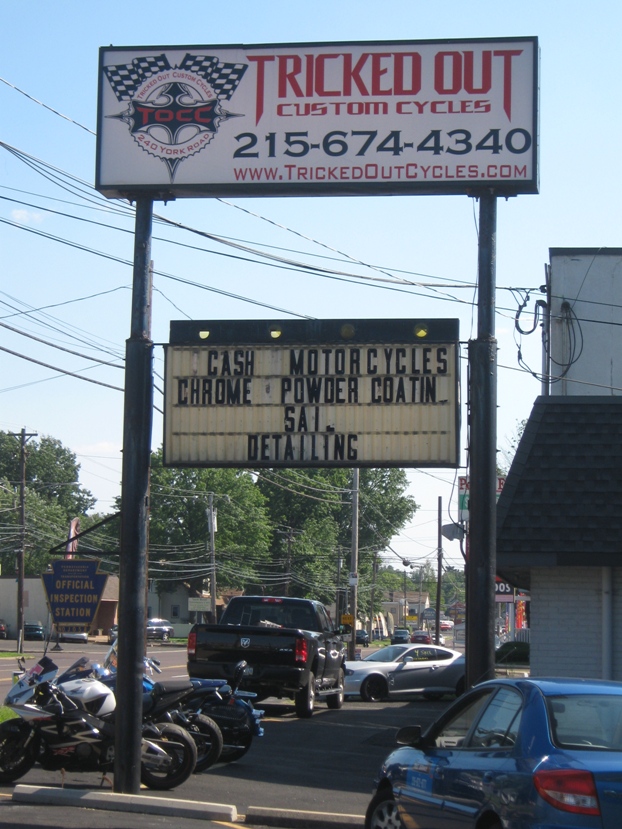
The Warminster shop, with its artwork outside.
Tricked Out Custom Cycles is today a full motorcycle service and repair shop. Parts sales, state inspections, and insurance estimates are among its services. But obviously, given the name on the shingle, they are best known for giving bikes a complete facelift…from powder coating and chrome plating to airbrushing and artwork, including on helmets. On a sunny day, any visitor to the shop can view over a dozen dazzling examples of motorcycle artistry.
“The biggest thing that sticks is our paint work,” Kehler points out. “That’s the first thing that people see and the last thing that they’re gonna remember about a bike.”
And the owner confidently states that what separates Tricked Out from the competition is the ability to do it all.
“We add a unique touch to it, because of our in-house coordinating with customers as far as what they’re interested in, and bringing that concept into reality. Which is very hard for a lot of shops, because they’ll outsource so many things. We can take that bike from start to finish, from the front of the shop to the back of the shop, and have the bike come out completely transformed.
“We do use a lot of parts suppliers, but it’s really how you coordinate and put those things together. It’s like a recipe – you put a couple different ingredients in and it tastes completely different. So we try to put all the right stuff together.
“Some shops try to bite off more than they can chew, and fall short on all areas. We complete what we do 100% and what we can’t do 100%, we’re gonna point you to the person who can. The motorcycle community is pretty tight-knit, and if there’s something you don’t specialize in, you know someone that does and you can get them going in the right direction.”

They do helmets too. And quite well.
After fifteen years of treating their customers like family, Tricked Out no longer operates out of Kehler’s garage. He and his crew have enjoyed enough success to expand into the 9,000-square foot facility in the suburbs—because “taxes are cheaper in the suburbs”—Kehler asserts as if it doesn’t need to be said. Business is steady, he would say…part of his job is reading approximately 300 e-mails a day. He has no plans for expansion; his focus is to become better, not bigger.
“I’m not looking to franchise out or anything. We are growing our art department; trying to venture out in a few different areas. But in any business, you have to evolve, and you have to stay on the edge, because what was popular five years ago isn’t popular now. In the custom world, you’ve gotta constantly be on your toes.
“My whole passion is to build. Once the build’s over I don’t go, oh, this is my masterpiece, because instead of adding more bikes to my collection…I have quite a bit of a collection…I’ve focused on the last couple years on doing what my customer’s masterpiece is.
“Expanding is difficult, because it’s not like you’re going to play the same song over and over. It takes a lot of open-minded people and they’re hard to come by, the ones that get it, and the ones that stay for you a while and keep getting it.”
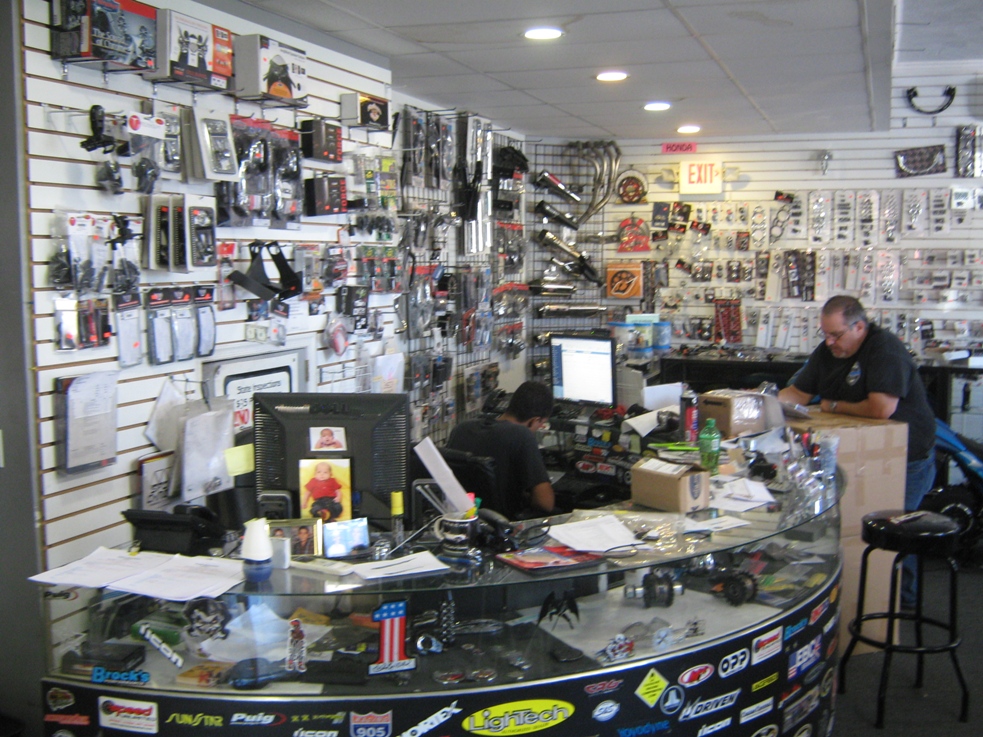
The shop, with everything your bike needs.
So could Tricked Out be a subject of its own reality show, like Orange County Choppers?
“Oh, I think we absolutely could, but my show wouldn’t have to be propped. We are a very interesting group of guys here, we have fun.
“And people don’t want to be uptight. They want to feel comfortable, they want to feel relaxed, and they want to joke around. Being a motorcyclist, and being around peers, my personality kind of fits the bill. I don’t sugarcoat a damn thing. I give people bad news like it’s the best news I could give them. Because I just let it out. And people respect me for that.
“I’m not gonna fake a new bike every week that took 500 hours and we got it done overnight, that’s just unrealistic. Real builders laugh at those shows.
“Fame to me is a healthy family and a happy family. And that’s what my focus is. All of my employees, we’re all family men here. We’re not trying to be famous, we’re trying to provide, and we’re trying to enjoy what we do.
And constantly getting better at it, I think should be everybody’s goal.”

The Scrapping Life – R. Fanelle’s Sons Recycling
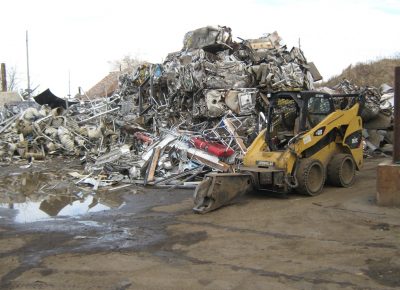
The Fanelle family no longer owns and operates their Camden-based scrap metal recycling service, but they had a great run…serving the scrapping community from their Camden location for over a century.
I had a chance to interview Tom Fanelle, the third-generation owner of R. Fanelle’s Sons, for the February 2015 issue of JerseyMan. You can view the PDF from the magazine here.
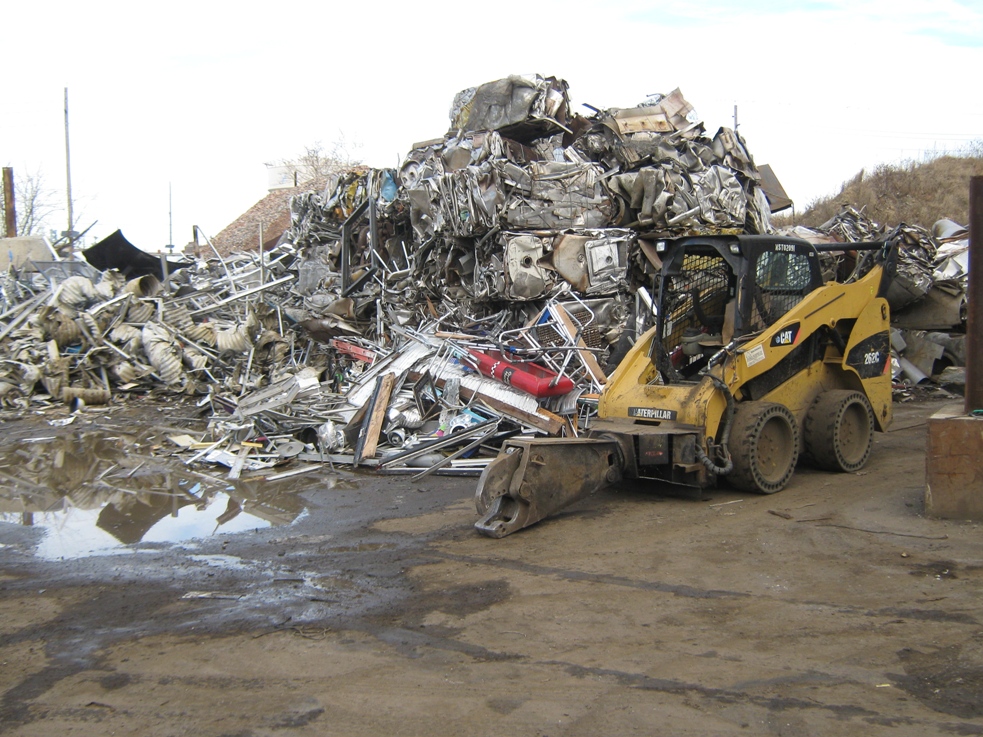
There’s money to be made in this stuff.
The Scrapping Life
Tom Fanelle will recycle and re-sell just about anything metal, but he has limits.
For instance, don’t try to sell him your prosthetic leg.
“One day,” he explains, “Two guys come in. One guy walks in, the other guy is hanging on to his back. The guy hanging on has no legs. The guy in the front is holding a titanium prosthesis, and he said do you buy titanium? It was the other guy’s leg! One of his two legs, we don’t know what happened to the other one. We threw him out.”
However, he did take the gun that killed Gianni Versace.
“After they investigated Versace’s death, they transported the gun up here; this was a national facility, so the FBI got involved. They did the investigation, they were done with the gun, and they contacted the owner because it was stolen.
“She said, ‘I just want the gun destroyed.’ Philadelphia FBI, Cherry Hill, I had them all here, we had coffee and donuts, we cut the gun and I picked up the pieces. I have them here somewhere. Just for the sake of saving it, not that I would sell it or anything.”
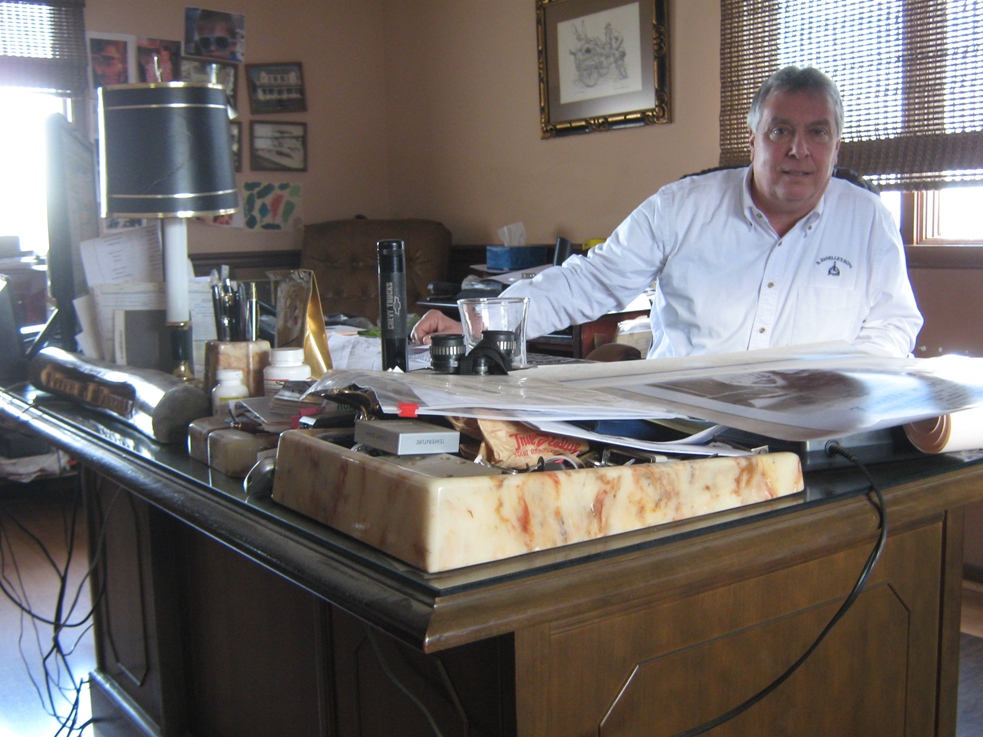
Tom Fanelle, carrying R. Fanelle & Sons past 100 years.
Tom Fanelle is the third-generation owner of R. Fanelle’s Sons Scrap Iron & Metal, a Camden-based recycling scrapyard. R. Fanelle’s Sons recently celebrated an impressive milestone…100 years of recycling metal in South Jersey. No small achievement in an industry with its share of mergers and acquisitions, but Fanelle would tell you that’s been part of their strength.
“We have the personal touch here,” he proudly notes. “If someone calls, they’re talking to me.”
The “R” in R. Fanelle stands for Rocco, Tom’s grandfather, who started the business in 1914. Rocco emigrated from Accettura, Italy, at the age of 18. After a few years working in the rag business with his uncle Donato, Rocco went into business for himself.
“He got a pushcart, walked around the streets and collected scrap,” Tom says. “In those days, there was an assortment of things they used to recycle. They recycled rags, they recycled bones, they recycled dog feces, believe it or not. They recycled paper, metals, things like that. After a few years, he had people come on board, and he had two, then three pushcarts. They would go collect and bring it back to him; he was the home base for collections.
“In the 1930s or 40s, they started buying trucks. For I think three or five dollars a day, different vendors would come and rent the trucks, and now they were able to reach into the suburbs.
“Business flourished during the 50s; it was a good time because we were so industrialized. RCA was one of our main customers. As businesses have died, other businesses have come up since. There’s always some demand, even though manufacturing is down considerably in South Jersey.”
Today R. Fanelle’s Sons serves three types of customers. There are industrial businesses like refineries and chemical companies; commercial businesses like road and demolition contractors; and peddlers…the “mom and pops”, Fanelle says, people with pickup trucks who make their living bringing in scrap metal they find.
When asked if it’s something like Pawn Stars, he shakes his head with a chuckle.
“I always use that as an example, but no. The Pawn Stars people negotiate price, here we have firm prices. Once something is identified as being a certain type of material, it has a price that goes with it. Everything is based on market conditions.
“It’s funny because a lot of people come in and say, ‘Well, I can get ten cents more up the street’. Well, so be it, if that’s what you want.”
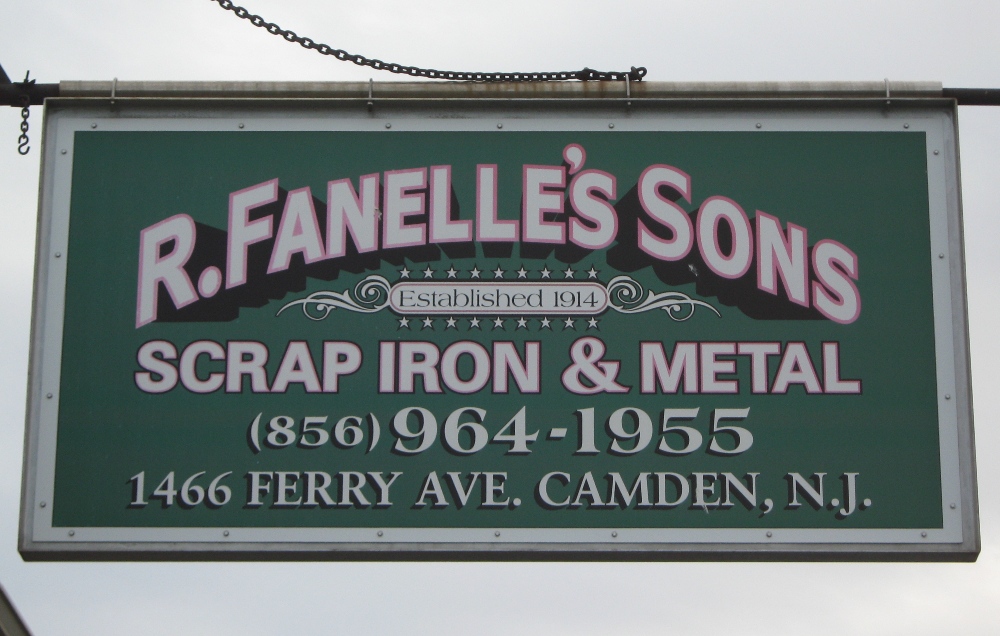
A South Jersey Institution since 1914.
Fanelle doesn’t spend time worrying about competition. His customers return, he says, because of the store’s good name. The challenge is maintaining a balance between servicing customers and protecting against metal thieves.
In recent years, the New Jersey state legislature passed bills requiring tougher restrictions on scrap metal dealers. Among the new standards were requiring dealers to pay by check and provide daily records to the state of each transaction. Dealers would also be required to report license plate numbers of anyone bringing scrap to be processed. Both bills passed the legislature but were vetoed by Governor Christie.
Fanelle was quoted in the Gloucester County Times opposing the bills. His concerns were the privacy of his accounts and the nature of his relationships with smaller customers. Otherwise, he didn’t have a problem with most of the legislation.
“Most of the things they tried to enforce, we do. We do photo ID, the license plate number, and everything we buy is documented and associated with a picture ID,” he says.
“One of the things was that they wanted us to stop paying by cash. Well, a lot of these people, they’re hardworking people and they work hand to mouth. They need the money today, the legitimate ones, anyway.
“If my competition does it, that’s fine. I don’t just mean New Jersey, I mean Pennsylvania, Delaware, because that’s what will happen. If you can’t pay by cash, people will go where the cash is.”
Fanelle also points out the problem with daily records. “My complaint was two things: one is, are you going to hire someone to review these every day? They’re available if you need them.
“The other thing is that I have a customer base. What if someone is reviewing my customer base and they have a friend in the business? They can go to their friend and say, Fanelle is buying scrap copper from this guy, why don’t you go see him? My base, I think, is kind of private, and they shouldn’t have that unless they need it.”
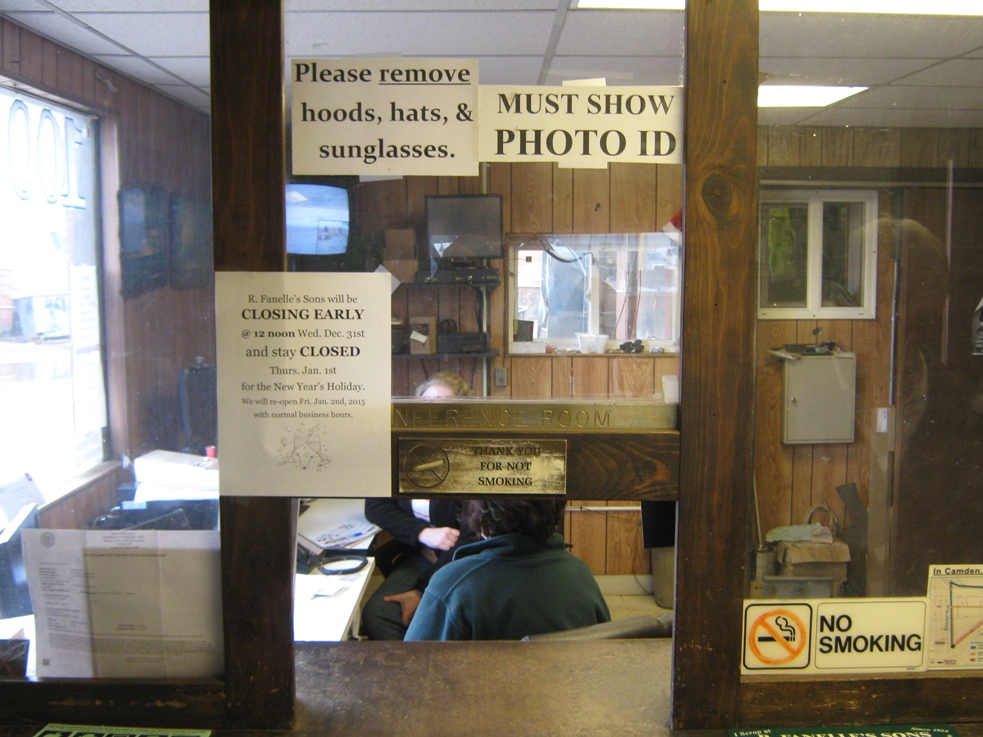
Yes, they get a good look at your face here.
Fanelle does concede that theft is a problem. Over the years he has seen some elaborate schemes, like the Locustwood cemetery thefts that were cited as a reason for the legislation.
“A fellow shows up here one day from a local cemetery, and he had all this brass. We said we don’t take it. He says, we’re doing something at the cemetery, we’re replacing these urns. I said if you have some kind of letter from the cemetery, I need something like that.
“He came back; he had a letter and the cemetery truck, so we bought them. He came in again, and again, over a series of months. He’d come in with the truck, and he was on his two-way radio talking with guys at the cemetery, saying we have a funeral at plot so-and-so today. So we thought everything was legit.
“I get a phone call from the Courier-Post one day; someone was doing an article about theft in cemeteries. He started to rattle down names, Calvary, Cole Cemetery. I said wait a minute, before you get to Locustwood, you need to know, they’ve been scrapping stuff. I said it was a project they were doing.
“Next day it ends up in the paper, over 200 urns stolen from Locustwood. When I read the paper, I hit the roof. I called Joe Vitarelli in Cherry Hill; I said you better get down here. So he came down, I explained the story to him, and they got the kid.
“We were led to believe what these things were, and when we heard there was a problem, we went right to the police. We have to be on our guard, we could get in serious trouble.”
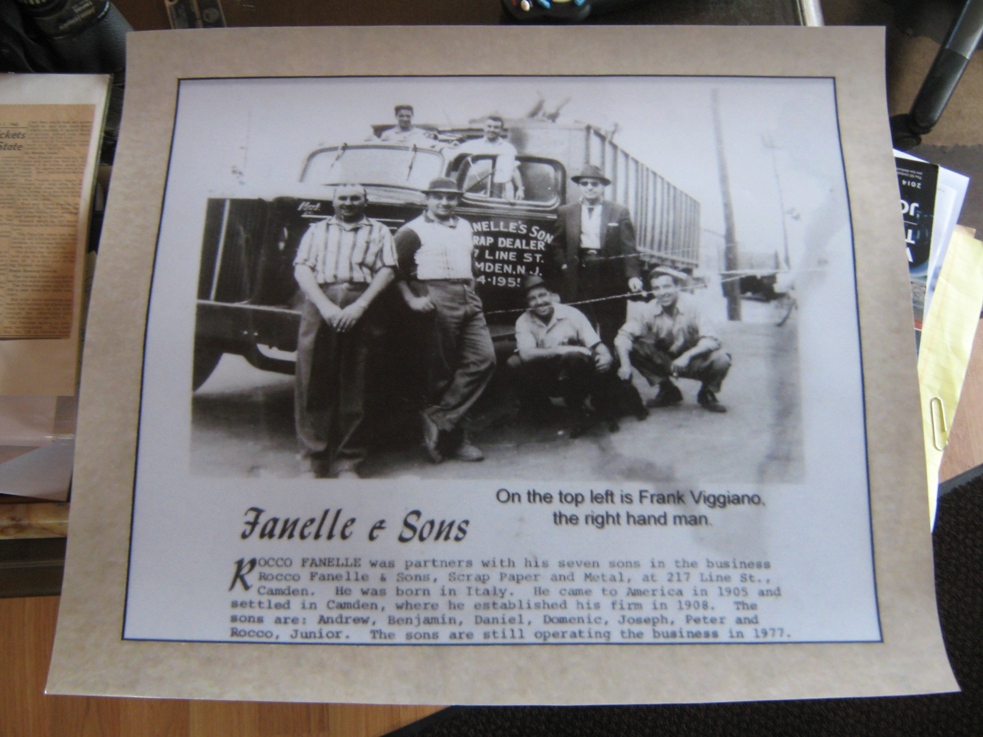
The early days of Fanelle family community service.
Part of the job, but it has its rewards. Fanelle mentions his recent involvement with the S.S. United States Conservancy, in their effort to preserve the 62-year-old ocean liner that once broke the trans-Atlantic speed record. The S.S. United States has been docked at Pier 82 in Philadelphia for 18 years now, but it’s not cheap to keep her there.
“We harvested a lot of metal out of the hull of the ship, bought some propellers, to keep the conservancy able to maintain the ship in Philadelphia. I think it’s been a win-win for both of us. I like to feel as though we’ve supported their cause the past three or four years. That’s a big thing; it’s a lot of notoriety.”
All in a day’s work for Tom Fanelle and his crew, some of whom have been there almost as long as Fanelle, who’s been in the business 45 years now. He jokes about having employees that say 15-20 years there is nothing. Employees are respected as much as customers.
It’s been that way at R. Fanelle’s Sons for a century now.
When asked about the secret to his shop’s continued success, Fanelle keeps it simple and obvious. Treat customers right.
“We go to the end of the world to service our customers. We do whatever we can to make things easy for our customers. People enjoy doing business with us. They’re comfortable with us.
“You can beat somebody and cheat them one time, or you can treat them good and have them ten times. My father used to tell me that.”
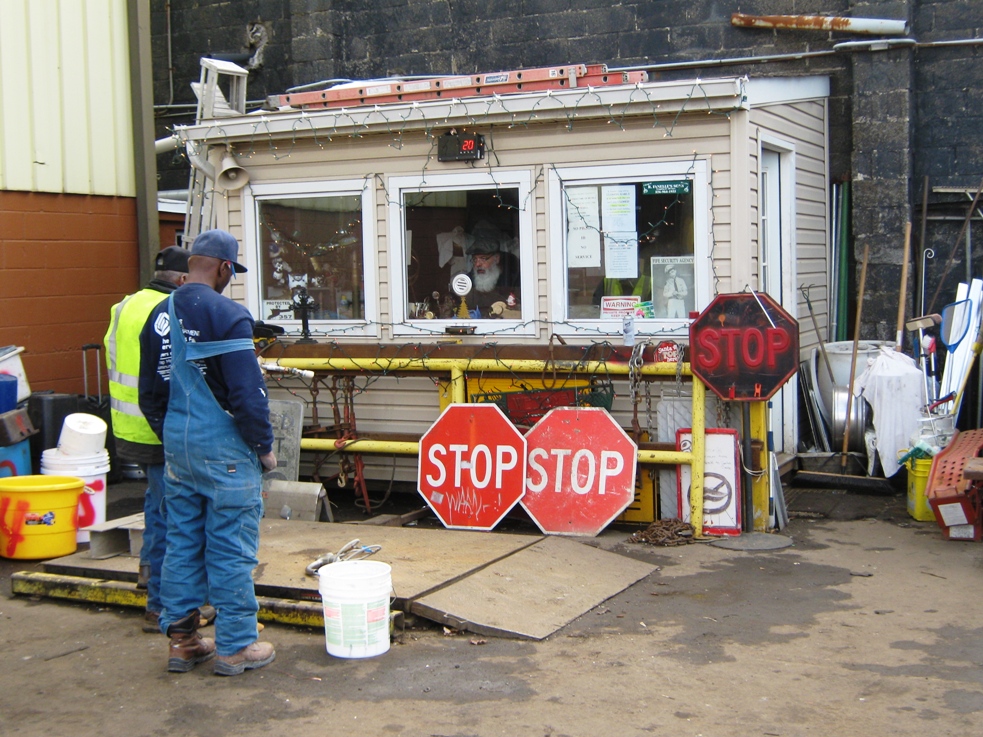
Yes, we’ll weigh your scrap metal for you.
Want to Try Scrapping?
There is a link on the R. Fanelle’s Sons website to the iScrap App, a free download that displays market prices of common metals, a listing of all of the different types of metals that get recycled, and tips and news stories for people interested in scrapping.
The glossary of metals includes pictures and descriptions of ferrous and non-ferrous materials, but there’s also an interesting list of electronics: cell phones, backup batteries, speakers, and various parts of PCs, including mice and towers, are all things that can often be brought to a scrap yard for cash.
The app also contains forums where people can share their scrapping tips – one poster described his experience collecting rotting mobile homes and RVs from people’s backyards in exchange for the owner’s paying for the dumpster to carry it to the scrap yard. He claimed the work brought him $10,000 in three months.
As if that weren’t enough, the app includes scrapping news, with more helpful articles for scrappers. Stories include information on the scrap value of forklifts, a video with tips for scrapping cellphones and PC motherboards, and trends in the prices of scrap metals.
Interested scrappers can download it at iscrapapp.com.
Frequently Stolen Metal Items
Metal thefts have increased with the prices of metal, and as Fanelle notes, often times thefts are related to drug usage. Some of the more common items in thieves’ crosshairs include:
Manhole covers: A CNN Money story tells of officials in Beijing, China, replacing the manhole covers with non-recyclable, non-metal materials, after the city lost nearly half of its 600,000 manhole covers to theft. In May of 2008, Newsweek reported increasing manhole cover thefts In Philadelphia, Chicago, and Greensboro, NC.
Copper wire: copper prices increased dramatically between 2002-2007, so much that a black market formed to steal copper wire from phone companies and railroads. In 2008 the Seattle Post-Intelligencer reported the theft of a 3,000 pound copper bell from a Buddhist temple; in 2009 the Oregonian reported the story of a man severely burning himself attempting to steal copper wire from a high voltage box.
Cemetery markers: The Courier-Post broke the story of urns being stolen from several local cemeteries including Locustwood; 100 vases were stolen from Brockton Union Cemetery in Boston. In April of 2008, over 1,000 bronze markers were stolen from a concentration camp cemetery in the Czech Republic.
Good For Your Planet’s Health
According to the Institute of Scrap Metal Recycling Industries (ISRI), the reduction in CO2 emissions from worldwide scrap recycling totals approximately 500 million tons each year. On ISRI’s website you can find a fact sheet that lists the gasoline energy equivalent of recycling certain materials, and the resulting reduction in greenhouse gas.
For example:
Recycling one car = the energy equivalent of 500 gallons of gasoline = 8,811 lbs. of greenhouse gas emissions
Recycling one refrigerator = the energy equivalent of 36 gallons of gasoline = 566 lbs. of greenhouse gas emissions
Recycling ten lbs. of cardboard = the energy equivalent of 2 gallons of gasoline = 40 lbs. of greenhouse gas emissions
This isn’t to say you would be able to drive 50 miles on ten lbs. of cardboard, but that doesn’t make it landfill material.
Source: www.isri.org




















